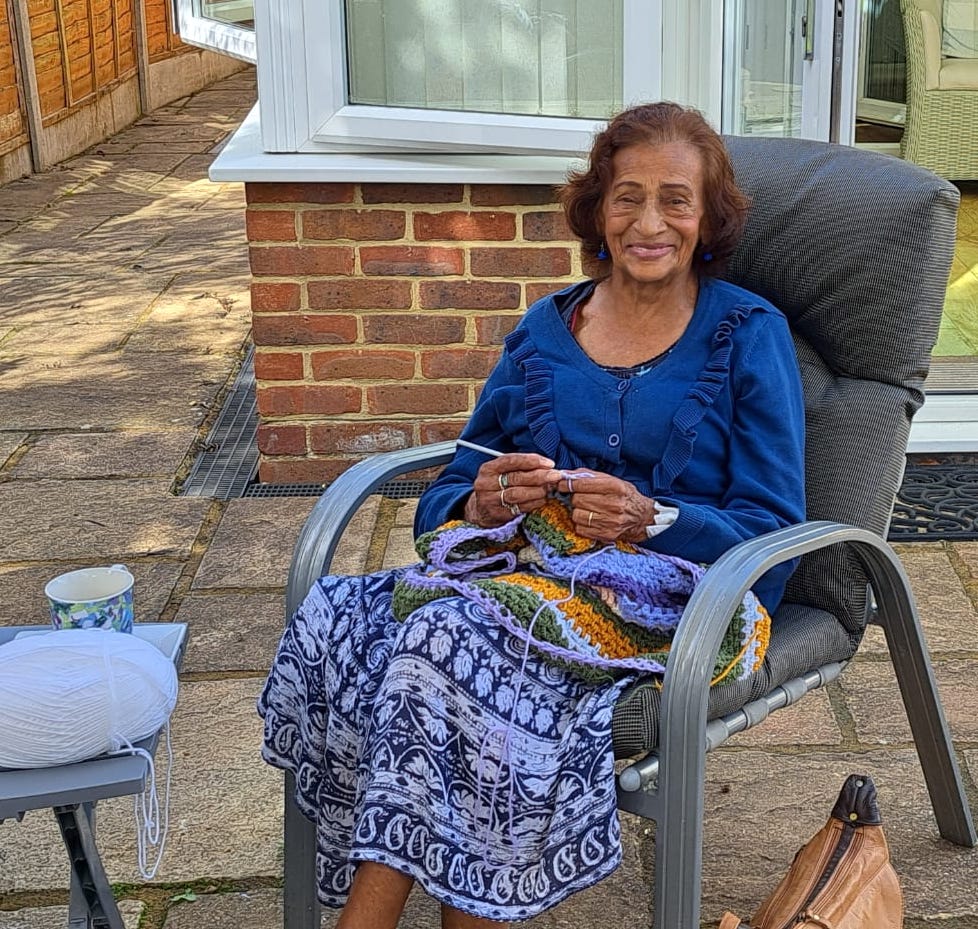News
July 2024
The NHS urges people with undiagnosed dementia to come forward

Dementia is back on national news with the latest NHS data showing that a record number of people in England have received a dementia diagnosis in the past year – nearly half a million people.
However, the NHS admits it has more to do to meet its target to diagnose 66.7% of the total number of people that estimates suggest are living with a form of the disease.
This is why the NHS is calling on people to come forward to be checked if they have any signs of dementia.
Dr Jeremy Isaacs, national clinical director for dementia, NHS England, said: “Common early symptoms of dementia include forgetting bits of information, saying the same thing repeatedly, struggling to follow a conversation or find the right word and being confused about time and place. Usually, these problems will be more obvious to the person’s family and friends than to the individual themselves.
“If you have noticed that someone has symptoms, please encourage them to visit their GP for an assessment – the sooner someone is seen, the quicker the NHS can help.”
It’s positive that more people are being assessed – so that support, treatment and care can be arranged – but it appears a postcode lottery remains. A recent all-party parliamentary group (APPG) estimated that more than 115,000 people are going undiagnosed because of where they live. It highlighted the need for a significant increase in scanning capacity and for NHS integrated care boards to introduce local plans to increase access to diagnostic services.
If you live in Surrey or West Sussex, we would be interested to hear about your experiences in obtaining a diagnosis, so that we may help others in a similar situation.

The ever-cheerful Geoff celebrated his 75th birthday with our host Ian in Southwater and other guests, sharing a delicious home-made cake.
Born in Yorkshire, Geoff particularly loves music, walking with his cavapoo Maddie, gardening and watching rugby.
A retired commissioning manager for BP, Geoff travelled extensively until his early retirement aged 49 due to cutbacks. After returning to England from France, Geoff and his wife Mary ran a successful B&B for 10 years.
They have two children, a son and daughter. The latter’s return to the UK after 18 years living in the Far East means the family, including four grandchildren, is able to be reunited regularly, bringing much joy.
Can you help support someone young dealing with the challenges of dementia?

The University of Exeter is looking for children, young people and professionals who have regular contact with someone who has dementia to help with a research study called CareCoach.
The purpose of the project is to create web resources for children and young people who live in a family affected by dementia.If you can help with this study, please contact carecoach@uea.ac.uk.
Getting the creative juices flowing
Our creative Hassocks host Sarah has been busy teaching her guests some more new craft skills, this time air-dry-clay modelling, imprinting with wood stamps.
Are you struggling to keep hydrated?

Lots of older people, particularly those with dementia, struggle to drink enough, which is why Lewis Hornby was inspired to create water sweets for his grandma Pat.
The design graduate from the Royal College of Art and Imperial College London, came up with Jelly Drops, an innovative, sugar-free treat made from 95% water with added electrolytes and vitamins, no artificial colours, natural flavours and suitable for vegans. They are so soft that there is no choking danger.
Since launching in July 2020, the product has received 15 awards and the Alzheimer’s Society has partnered with Lewis and his team through its Accelerator Programme, which supports people to develop product and service innovations to help people living with dementia.
For further information, visit jellydrops.com.
June 2024
Another reason to nurture nature

Gardening is a hobby that gives incredible joy to millions. Now it looks like it may help to stave off dementia, too, regardless of wealth and education, according to the newly published paper Journal of Environmental Psychology.
The research project by Edinburgh University psychologists tracked more than 450 children born in 1921 in the Edinburgh area from the age of 11 to 79 with regular lifestyle and brain-health tests.
The researchers found that those who spent time gardening had better brain function in later life than those who did not. Of more than 450 tested, almost 30% had never gardened in their lives, but 44% still did regularly into old age.
It concludes: “These results identify a promising new line of inquiry for understanding the lifestyle factors that may promote successful cognitive ageing.”
Here at Tapestry Day Club, our hosts entertain guests in their own family homes and encourage them to enjoy their gardens. Some make full use of “flower power”, also using them to create artwork.

Celebrating Sussex Day

Our enterprising host in Southwater decided to celebrate Sussex Day 2024 (Sunday 16 June) with his guests by creating a quiz with fascinating facts about Sussex as well as serving up a delicious Sussex pond pudding – a first taste of this treat for some.
Keeping fit at 95

Tapestry Day Club member Beryl celebrated her 95th birthday recently with her Beare Green host Kerrie and other guests.
Remarkably, Beryl still lives independently, in the home her husband built on a plot of land in Capel in 1951. Beryl grew up in Lower Kingswood and met her husband, Sonnie, a bricklayer, at the age of 16. She remembers the moment they met with great clarity; it was love at first sight. Sonnie set up his own building company and they went on to have two sons and a daughter.
Beryl was devastated when he died in 2017. She treasures his memory, particularly the precious photos she has of her handsome husband. With one granddaughter living in Australia, another in New Zealand and a grandson in France, she holds dear all her family photos, also as Sonnie was a keen photographer and they were both members of Capel Camera Club.
These days Beryl enjoys playing whist and bingo at TDC and her fitness is an example to all. When her fall detector alarm went off last year, her daughter checked the remote security cameras only to find her mum doing star jumps.
Are blood tests the answer?

It is exciting to hear that thousands of people in the UK are taking part in countrywide trials to identify accurate and quick blood tests that can diagnose dementia in a project led by research teams at the Dementia Research Institute at University College London (UCL).
The hope is that the trials will capitalise on recent breakthroughs in potential dementia blood tests to generate the evidence needed for them to be used in the NHS within the next five years.
Currently, people are usually diagnosed with dementia using memory tests and brain scans, which are less accurate than “gold-standard” tests, such as PET scans and lumbar punctures, available to only 2% of the people that need them.
The team will focus on the most promising biomarker for Alzheimer’s disease called p-tau217. This reflects levels of two hallmark proteins found inside the brain in Alzheimer’s disease – amyloid and tau. The researchers want to learn whether measuring p-tau217 in the blood increases the rate of diagnosis for Alzheimer’s disease not only in people with early dementia, but also in those with mild, progressive memory problems.
They will test multiple existing and novel blood tests, looking at a range of types of dementia, including Alzheimer’s disease, vascular dementia, frontotemporal dementia and dementia with Lewy body. The researchers will also look at whether blood tests can help detect these diseases at various stages.
With timely and accurate diagnosis recognised as being crucial for people to access vital care, support and the latest treatment, this would be a major breakthrough.
Who cares for the carers?

Highlighting the increasing pressures on carers and to campaign for much-needed recognition and support is the aim of “Putting carers on the Map”, the theme of this year’s National Carers Week (10-16 June 2024).
According to Carers UK, there are an estimated 5.7 million unpaid carers across the UK. A staggering 82% of carers surveyed by Carers UK said the impact of caring on their physical and mental health would be a challenge over the coming year, with nearly 60% adding that being valued as a carer would improve their wellbeing.
At Tapestry Day Club, we measure our success through the respite hours we provide to the carers of our dementia guests – more than 11,000 hours last year. We carried out a survey recently and asked carers how they benefit from the “me time” we provide.
The responses were incredibly touching from “It is such a lifeline” and “I rely so much on this free time for me to recharge my batteries, to be able to see friends, to carry out tasks without constant interruption and generally relax” to “I have time to spend not worrying about leaving my husband” and “I can stop being alert and permanently on call.”
We would like to take this opportunity to salute all carers; you are not forgotten, you are not invisible.
A big thank you to our volunteer drivers!

With Volunteers’ Week (3-9 June) upon us, we would like to take the opportunity to thank all our wonderful volunteers who help transport our guests on a weekly basis.
We have found that transport is often a fundamental part of the service we provide to our guests, so we frequently need more space than our hosts have available in their cars.
Having volunteer drivers means more people are able to benefit from our club and in some cases we have also managed to reduce the amount of time our hardworking hosts spend travelling.
So, we would like to say a big thank you to our regular volunteer drivers – Steve, Murray, Michelle, Liz and Jim – and everyone who has helped out and stepped in during a time of need.
We don’t know what we would do without you!
May 2024


One of our newer guests recently celebrated her 80th birthday at the home of our host Sarah in Hassocks together with other guests. Everyone thoroughly enjoyed the home-made cake and Sarah also picked a beautiful bunch of flowers from her garden as a gift.
Margie has enjoyed a most colourful life, living all over the world. Born in Pickering, North Yorkshire, she is full of amusing stories of her time at boarding school in Suffolk. After that, she spent a year at a finishing school in Switzerland, where she learnt French, German and Italian.
Her first job was working for MI5 as a typist – having signed the Official Secrets Act. Married at 19, she moved out to Rhodesia, now Zimbabwe, with her husband and, 15 years later, she returned to the UK with her daughters and worked as a dressmaker specialising in wedding dresses.
Once her children left home, she moved to Romania for 10 years, where she worked for a church. Following another spell in Zimbabwe, Margie moved to Burgess Hill in 2015.
Here, with her cat for company, Margie lives independently with the aid of a mobility scooter, which allows her to get out and about in Burgess Hill. Even now, she keeps herself busy, looking after the accounts for a couple of locals in between gardening, playing scrabble and other games. She’s so active, also on her laptop, she doesn’t have a TV.
With her wonderful sense of humour, she is a popular member of our weekly Thursday club.
Bringing joy with clever inventions

We would like to say a big thank you to Infrastructure investor John Laing for their £1,000 donation to provide our guests with new activities.
This means our hosts have been able to go shopping for some clever inventions specifically designed for people with memory issues, such as Relish Aquapaints. By applying water with a paint brush onto these reusable canvases, beautiful pictures magically appear. Leave them to dry, and the image will disappear, allowing them to be used over and over again.
Another hit has been the Life Story Interview Kits, which are 150 dialogue-prompt cards with conversation-starter questions such as “How did your family spend time together when you were young?” and “What life advice would you give to someone my age?”
Bingo has always been a firm favourite with our guests and now we also have audio animal bingo games, which allows callers to play authentic animal sounds to accompany the beautifully illustrated cards.
Thank you again, John Laing!
How it all started

The timing of Monday night’s BBC2 documentary The Jennings vs Alzheimer’s could not have been more poignant. A newly-published Alzheimer’s Society study projects that one in three people born today will develop dementia.
It is thanks to a letter written by Carol Jennings some 30 years ago, detailing all her family members affected by Alzheimer’s and putting them forward for a research project, that a hereditary mutant gene was discovered. And that breakthrough has been instrumental in the development of the first treatment that tackles the root causes of Alzheimer’s.
Yes, it is upsetting to see how all the family members have been and still are affected, but it is also a wonderful tribute to an inspiring woman who died in March aged 70. Not only did she donate her brain to research, her MRI scans over a 25-year period, starting before she had symptoms, have proved invaluable.
Her dream was that there would be a cure for future generations. Here’s hoping.
https://www.bbc.co.uk/iplayer/episode/m001z9vf/the-jennings-v-alzheimers
Party time!

For those living near Horsham on the Surrey/West Sussex border, the Warnham Park Garden Party and Cream Tea on Sunday 19 May, 2.30-4.30pm, is the final event for this year’s Alzheimer’s Society Dementia Action Week in this locality.
There will be live music, tours of the owner’s personal museum, cream teas, a raffle as well as a bake-off competition in the gardens of this privately-owned, 215-acre estate, which is regarded as one of the finest deer parks in the world, owned by the Lucas family since 1865. The Horsham Singing for the Brain choir will be in action, too.
The event is free to attend, but guests are invited to bring prizes and buy tickets for the raffle. It is also advisable to bring your own seat as more than 150 people attended last year and seating is limited.
Please RSVP as per the poster.
Alzheimer’s Society’s Dementia Action Week events

Next week’s Alzheimer’s Society Dementia Action Week (13-19 May 2024) kicks off with two events in the West Sussex locality on Monday 13 May.
If you are a gardening enthusiast, you could join the guided sensory walk at Borde Hill Gardens, Haywards Heath, 1.30-3.30pm, courtesy of the Borde Hill team.
Guests will be welcomed and directed to the Garden Marque, where Alzheimer’s Society’s Tim Wilkins will make introductions. You will meet head of horticulture Harry Baldwin and senior gardener Matt Johnson. The walk will start at 2pm, with tea, coffee and cake served at 3pm back in the marquee. Here a Q&A session will commence with experts including grower DeeDee Aitken.
To book a reduced-price, advanced ticket at £10.50 for the Borde Hill Garden sensory walk, visit
If you’re after support, Horsham Library is hosting an information drop-in session, 10am-1pm, in addition to launching its new Reading Well for Dementia booklist.
For the full list of local events, visit https://www.carerssupport.org.uk/2024/05/03/dementia-action-week/
Stay safe with a free Fire & Rescue check-up

Did you know that anyone who is less able to escape their home in an emergency, or has a higher risk of having a fire in their home, is eligible for a free Safe and Well visit from their local Fire & Rescue Service?
One of our guests who has already had a visit said: “We had a chat and were given a load of helpful booklets. We seemed to be up to date on most issues, except my electric blanket was more than 10 years old and they said that it was not safe. I have since replaced it.”
The pre-arranged visit lasts 30-45mins and offers advice on how to make your home safer. The fire service personnel who visit always carry identification and, where appropriate, fit smoke alarms or other specialist fire-detection equipment free of charge.
To check if you are eligible and book an appointment, visit:
West Sussex Fire and Rescue Service – Safe and well checks for you home
Surrey Fire and Rescue service – Safe and well checks for your home
April 2024
‘The piano is a superpower’

An octogenarian who has been living with dementia for six years became the winner of the opening episode of Channel 4’s second series of The Piano, which kicked off on Sunday (28 April 2024).
Duncan produced a tear-jerking performance of an original composition, written as a thank you to his wife, on the packed concourse of Manchester Piccadilly station. He will now go through to perform at a special concert at the end of the series.
Presenter Claudia Winkleman response to Duncan’s performance was to go straight up to the judges – world-renowned pianist Lang Lang and pop musician Mika – who were tucked away in a room overlooking the concourse: “He’s going to the concert, it’s not up for debate. Duncan and Fran need it. And it is also important to have somebody like that, and the fact that he can speak through the piano, and that is what is keeping the disease at bay.”
Mika replied: “What you are saying is this: we are here to show the power – no matter how old you are or your health– the power that that instrument can have. It is a superpower.”
Such a positive reaction, attitude and understanding is so heart-warming.
The series is aired on Sunday nights at 9pm. To view the first episode, please visit https://www.channel4.com/programmes/the-piano
When does old age begin?

There’s good news, not until you are 74, according to the latest study which was conducted over 25 years with more than 14,000 participants.
Author Dr Markus Wettstein of Humboldt University in Berlin, says: “Life expectancy has increased, which might contribute to a later perceived onset of old age. Also, some aspects of health have improved over time, so that people of a certain age who were regarded as old in the past may no longer be considered old nowadays.”
Even more uplifting is journalist Jan Etherington, who considers herself middle-aged at 77. She is an advocate of the truism “age is just a number” and that’s from someone whose husband was diagnosed with Alzheimer’s in 2019. She’s looking forward to dancing at the front to Duran Duran and Rick Astley at Suffolk’s Latitude Festival. What an example.
https://www.apa.org/pubs/journals/releases/pag-pag0000812.pdf
Can you help?
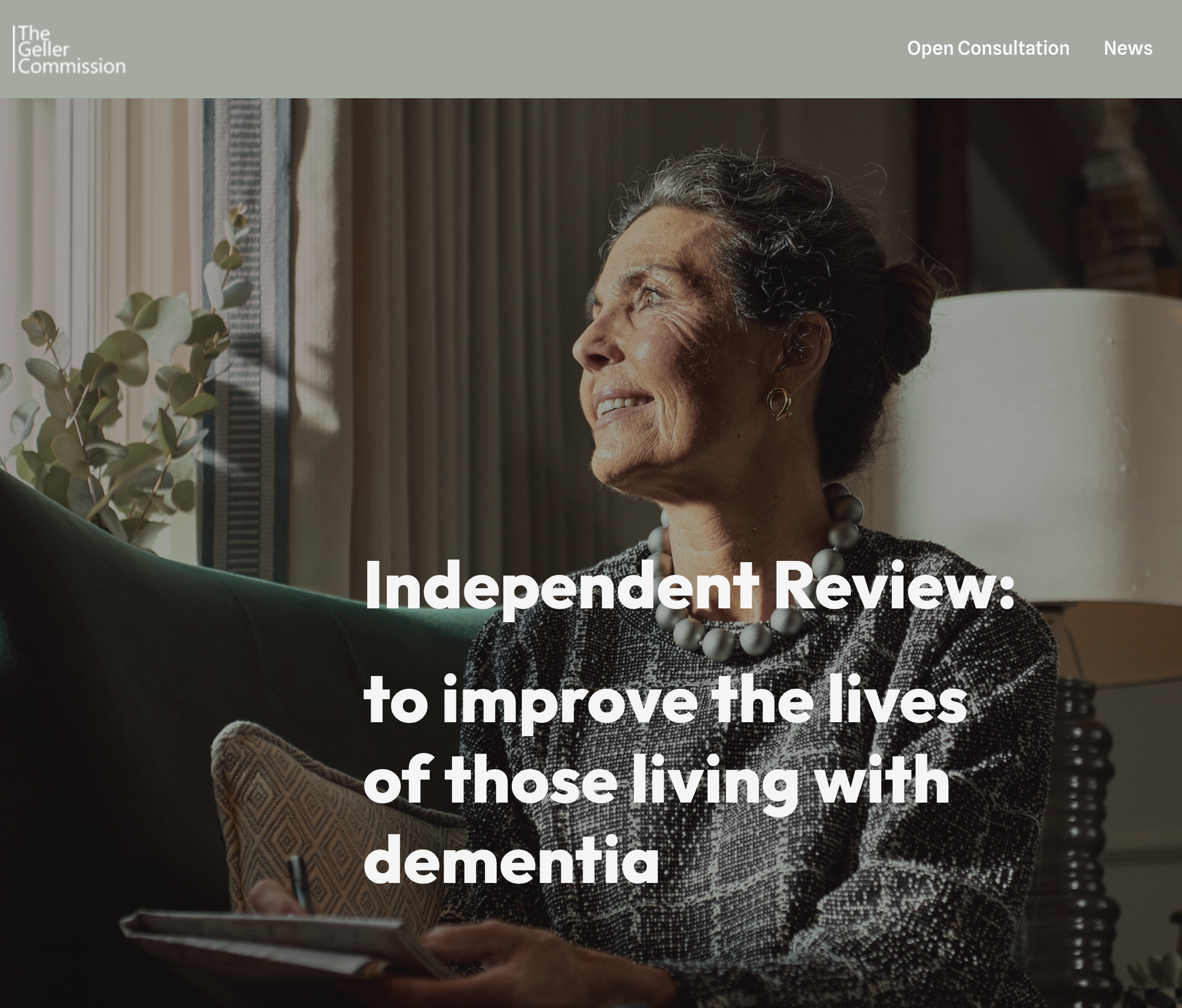
A group of UK’s foremost dementia experts, The Geller Commission, is working on an independent review, a nationwide public consultation, into dementia-related hospital stays. It is providing a platform for anyone impacted by dementia to have their say about dementia-related hospital occupancy.
The commission is looking into:
1 Preventative methods to avoid hospitalisation and empower care providers to act.
2 Improving care for people with dementia during their hospital stay.
3 Identifying barriers to a timely or appropriate discharge.
The open letter states: “We invite input from everyone across the spectrum, from nurses to neurologists, caregivers to those receiving care. Local government, charities, public health bodies, and carers all have a crucial role in supporting those living with dementia, and we seek your lived experiences to guide our review.”
The stats are scary. About 25% of hospitals beds re occupied by people living with dementia and readmission rates are more than double.
If you can improve the lives of those living with dementia, please visit The Geller Commission
Come and join us!
We are seeking hosts in the Farnham, Haywards Heath, Godalming and Bookham/Fetcham/Effingham/East Horsley areas.
To find out more and apply, visit https://www.tapestrydayclub.co.uk/work-with-us/
‘I want to go home’

It’s common for people with dementia to say they want to go home. According to an extremely helpful article by the Alzheimer’s Society, it may be caused by time-shifting – when the person experiences living at an earlier time in their life – or general confusion.
Whatever the reason, the upshot is that it is distressing for everyone.
Here are five points to consider:
- Home is likely to be referring to a sense of time or place, to represent a feeling of comfort and security, of being happy and relaxed. Therefore it’s best not to try to reason or disagree. Ask them to describe home and why they are happy there.
- Reassure them that they are safe and that you care about them.
- Try diverting the conversation, possibly by changing the subject. Sometimes keeping a photograph album handy, either a physical one or on a tablet or smartphone is helpful. The chance to reminisce may ease anxiety. Try to avoid asking questions about the pictures, instead, make comments along the lines of: “What a smart suit he’s wearing.”
- Try to work out why the person is feeling unhappy. Are they having a bad day?
- Keep a log of when they are asking to go home. Is there a common denominator? Is it near meal times because they are hungry, in which case a snack might help? Is it during times when the environment is noisier than usual? If there is a pattern, try to lessen or avoid some of the triggers.
You can read the full article here: https://rb.gy/1r5icv
A major boost

We would like to say a massive thank you to Surrey County Council and NHS Surrey Heartlands Better Care Fund Grant Programme for our recent funding.
The journey to be awarded this grant has been a long one and involved a tremendous amount of effort, but it’s been such a worthwhile process. It is such an honour to receive this grant as it is recognition of the difference we make to the lives of people with early-stage dementia and those living in social isolation.
It is an enormous boost as it will allow us to continue to grow to help even more people living with early-stage dementia and in social isolation.
How’s this for progress?
Less than two-thirds of people in England with dementia have a formal diagnosis according to NHS England, so it’s super exciting to hear from Alzheimer’s Research UK that two expert teams – one from University College London and the other from Dementias Platform UK at the University of Oxford – will conduct UK-wide clinical trials to identify blood tests to boost dementia diagnosis.
“Experts hope that the research will lead to blood tests for diagnosing Alzheimer’s and other forms of dementia on the NHS withing five years,” the press release states.
Director of Research at Alzheimer’s Research UK Dr Sheona Scales is quoted: “We’ve seen the enormous potential that blood tests are showing for improving the diagnostic process for people and their loved ones in other disease areas. Now we need to see this same step-change in dementia, which is the greatest health challenge facing the UK.”
A number of different blood tests that can diagnose Alzheimer’s and other causes of dementia have shown promising results in recent years, but they have yet to be tested widely. Thanks to a multi-million-pound award, recruiting for participants will begin soon.
To find out more, including registering your interest to take part, click here.
Paloma Faith on feeling isolated

“I think we live in a real era of isolation; it’s all internet or social media-led and quite confusing. I’m not quite sure what’s real and what isn’t,” Paloma Faith is quoted as saying in this month’s Round & About magazine.
That’s quite a scary thought. Social isolation appears to affect all ages these days. It’s not long ago that Libby Purves wrote an article published in The Times (18 March, Loneliness hurts both lives and livelihoods), discussing how it is in the national interest to encourage friendship.
We try to do our bit here to help older people foster lasting friendships by meeting up on a weekly basis.
Round & About Magazine; the feature is on p37
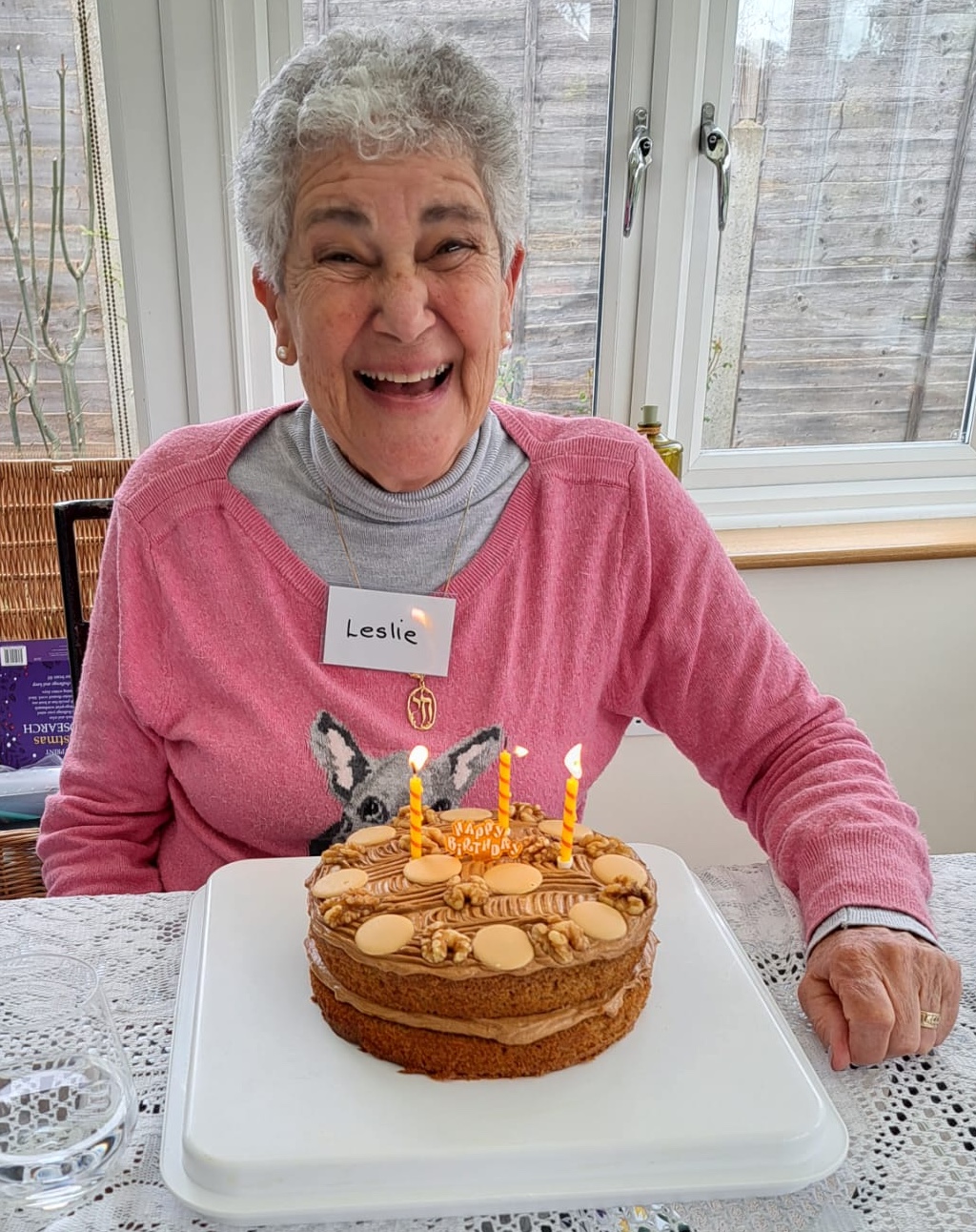
One of our newer guests, the joyful, bubbly Leslie, enjoyed her 81st birthday together with other guests at the home of our Mannings Heath host, the talented cakebaker @trudicousins, who made another scrumptious creation.
Leslie has a truly fascinating background. Born in Massachusetts, US, her large family originates from the Iberian Peninsula. They decamped to Russia generations ago, moving to the US to avoid persecution as Jews, which is where Leslie’s parents were born.
Having gained a master’s in science, Leslie worked as a teacher for many years. Widowed twice, she raised her two children single-handed, taking on other forms of employment, including working as a qualified dog walker for 30 years. Later on, she became quality assurance manager for a couple of large stores.
Leslie travels back and forth to the US frequently, and now lives with her daughter in England. She is proud of her Jewish heritage and speaks Yiddish. An avid reader, Leslie loves music, playing solitaire and is a worthy Scrabble opponent.
March 2024
Happy Easter!
Our hosts kicked off the Easter celebrations with some special treats for their guests all last week. Thank you to all our wonderful hosts for all their effort to mark this festival.
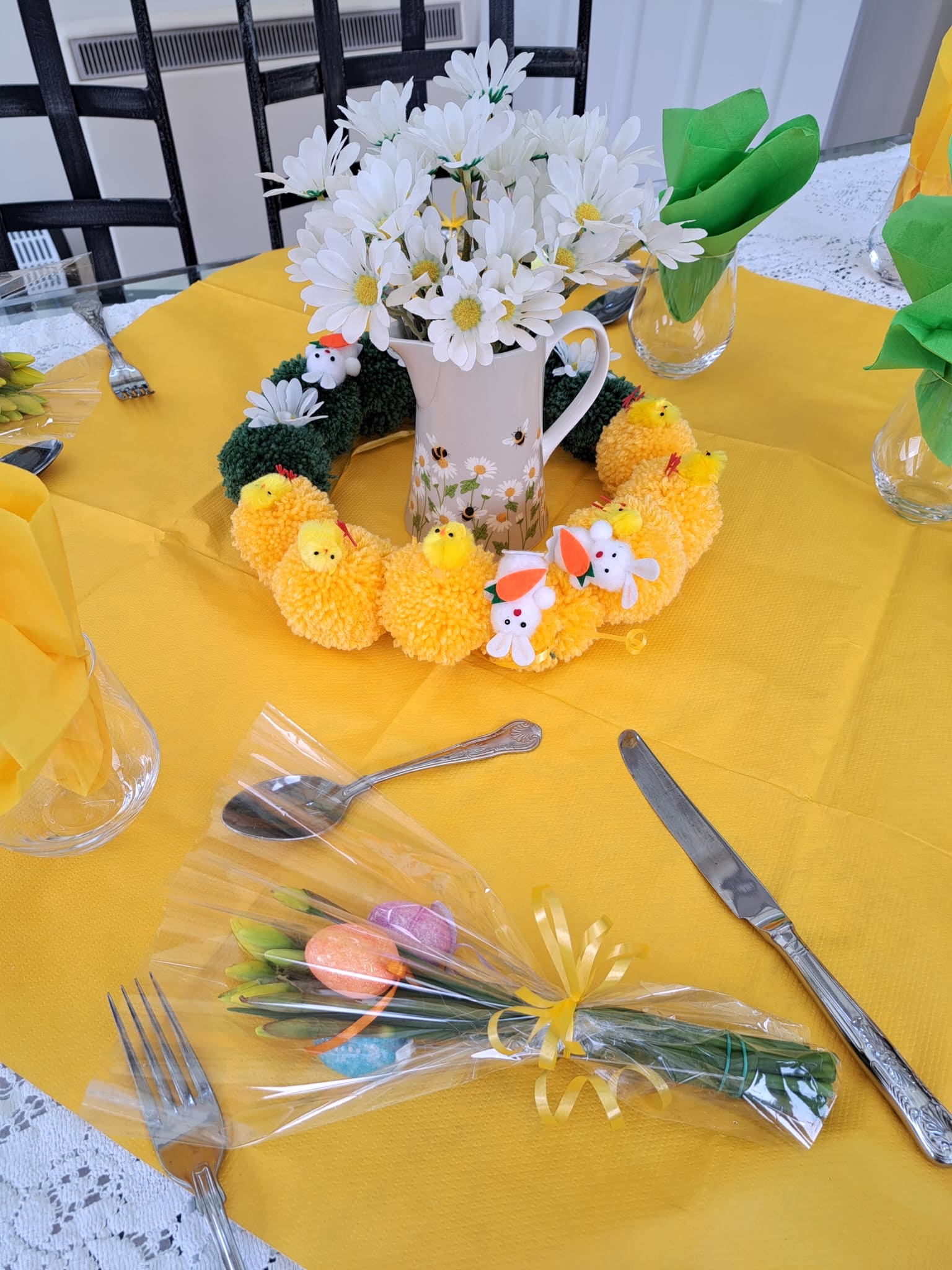
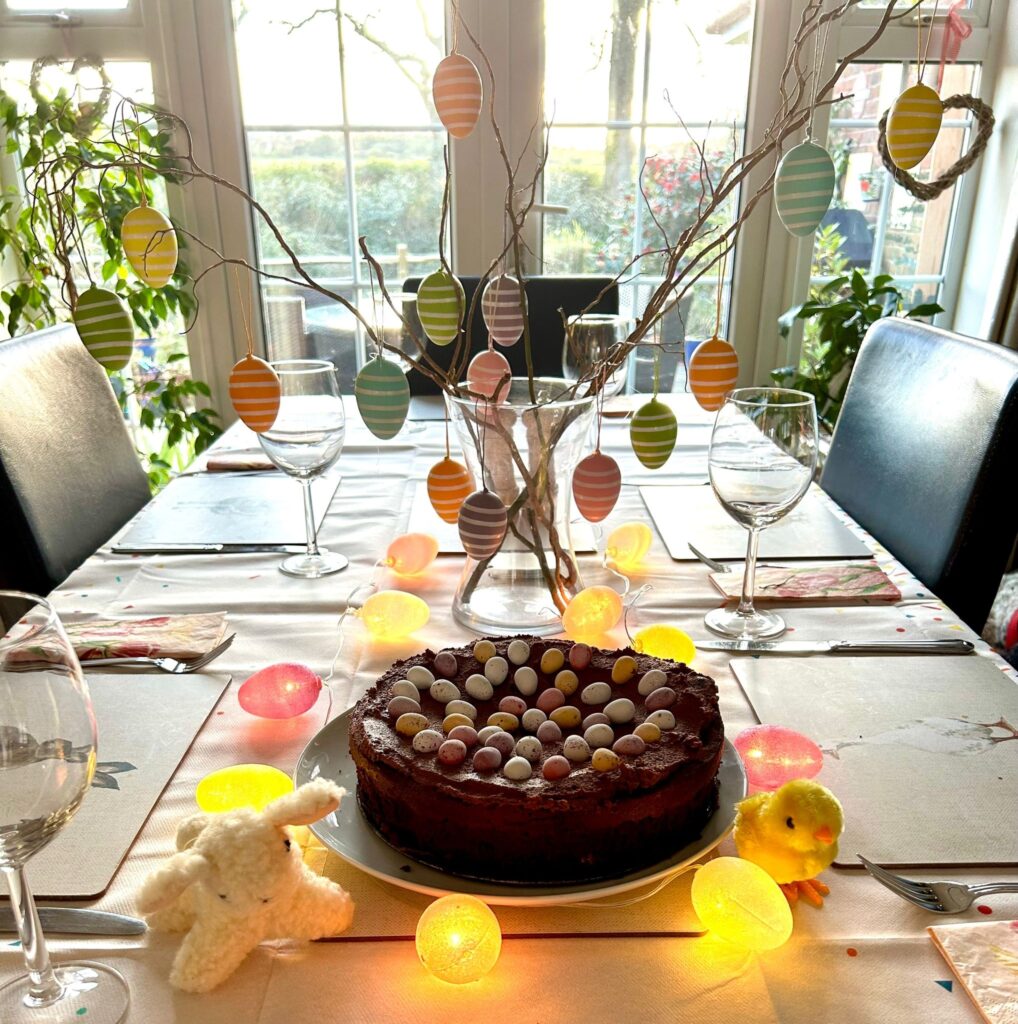
Why make music?

Well, there’s evidence that playing a musical instrument or singing in a choir is linked to better brain health in older adults.
Scientists working on the PROTECT Study – a 10-year project run by the University of Exeter and King’s College London in partnership with the NHS – have reviewed data from more than 1,000 adults over the age of 40 to determine whether musicality helps to keep the brain sharp in later life.
The findings show that playing a musical instrument, particularly the piano, is linked to improved memory and the ability to solve complex tasks. Continuing to play into later life provides even greater benefit. The work also suggests that singing was also linked to better brain health, although this may be due to the social factors of being part of a choir or group.
Anne Corbett, professor of dementia research at the University of Exeter, said: “A number of studies have looked at the effect of music on brain health. Our PROTECT study has given us a unique opportunity to explore the relationship between cognitive performance and music in a large cohort of older adults. Overall, we think that being musical could be a way of harnessing the brain’s agility and resilience, known as cognitive reserve.
“Although more research is needed to investigate this relationship, our findings indicate that promoting musical education would be a valuable part of public health initiatives to promote a protective lifestyle for brain health, as would encouraging older adults to return to music in later life.
“There is considerable evidence for the benefit of music group activities for individuals with dementia, and this approach could be extended as part of a healthy ageing package for older adults to enable them to proactively reduce their risk and promote brain health.”
Do you enjoy entertaining?
Husband of Corrie legend opens up about life as a carer
Julie Goodyear – famed for playing the leopard-print loving Rovers Return landlady Bet Lynch in Coronation Street for more than 25 years – announced her dementia diagnosis in June last year together with her husband Scott Brand.
In a recent interview with The Mirror, Scott opens up about the challenges and heartbreak of caring for someone with dementia. He talks about to coming to the realisation that he needed support, how the Alzheimer’s Society has been his lifeline and encourages anyone going through this journey to accept help straight away.
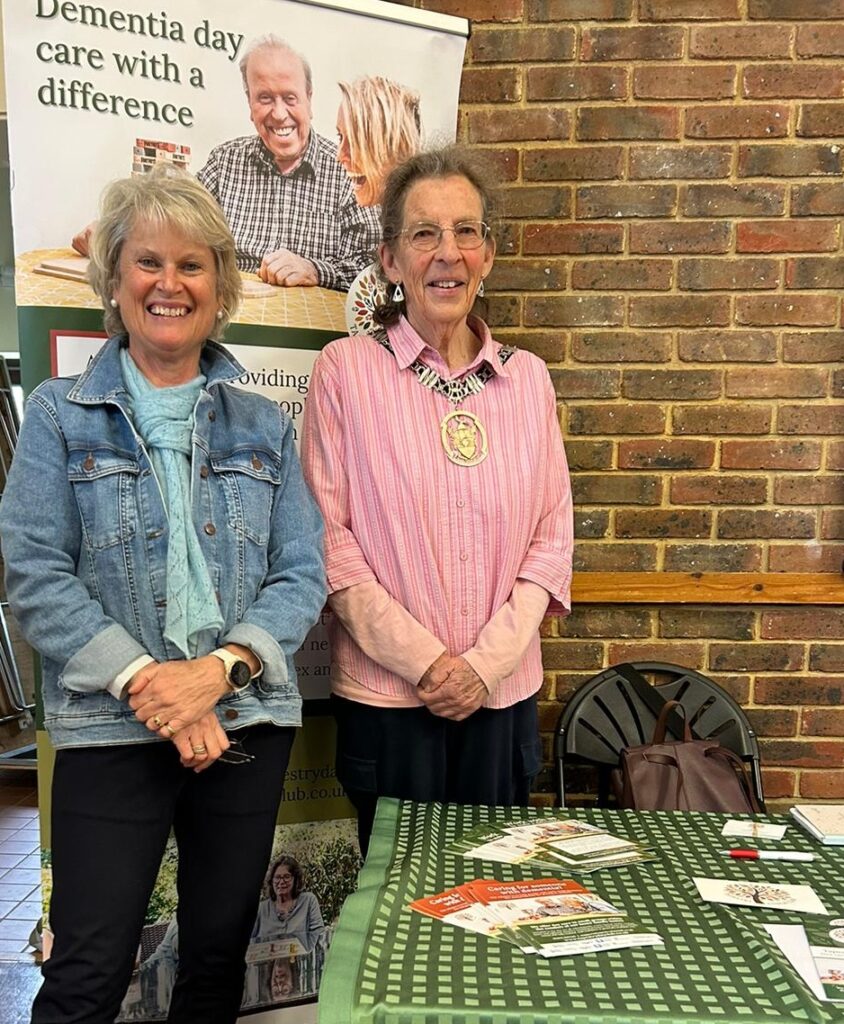
Tapestry Day Club co-founder Anderley with Mayor of Burgess Hill Councillor Janice Henwood
A big thank you to Mid Sussex Older People’s Council (MSOPC) for inviting us to have a stand at their recent annual forum. This charity aims to reduce loneliness and isolation by signposting to relevant groups and organisations as well as organising events and activities and providing support and advice. It’s always a pleasure to attend events like this to spread the word about the service we provide to help people remain living independently for as long as possible.
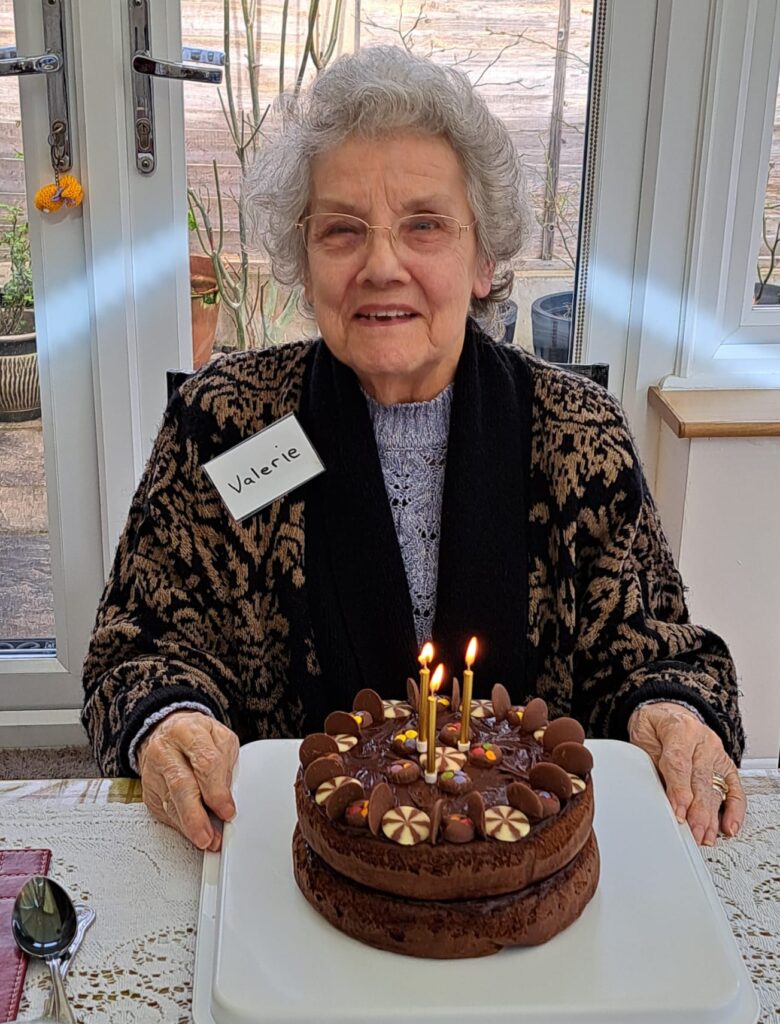
Valerie enjoyed her 81st birthday celebrations with a scrumptious cake courtesy of our host Trudi in Mannings Heath, which she shared with fellow guests.
Born in Cornwall, Valerie trained as a nurse before marrying Terry, a Coldstream Guard. She worked stints in A&E as well as on general and specialist wards, dipping in and out of nursing while raising her two children and travelling extensively around Germany as Terry rose through the ranks to become a major.
The family spent many years living in Germany, which included Terry completing two tours of Berlin before the Berlin Wall came down in 1989.
Valerie particularly enjoys singing, having gained her passion from a young age, when she was a member of her local church choir in Cornwall. She also loves jigsaw puzzles, reading, crochet and crafts, and now lives with her daughter, son-in-law and grandson. She has five grandchildren, plus four step-grandchildren and two step-great grandchildren.
Does being right matter?
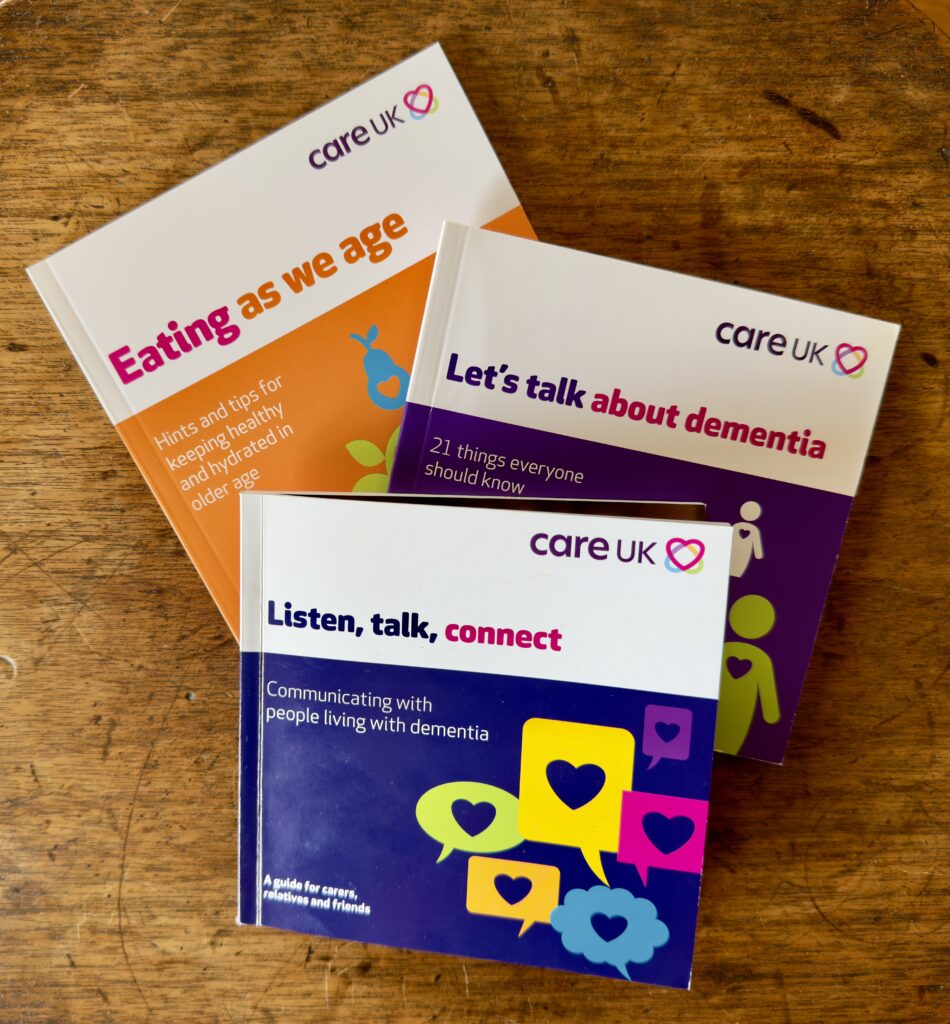
According to one of Care UK’s excellent booklets, Listen, talk, connect: Communicating with people living with dementia, the single most important piece of information to bear in mind when talking to a person with dementia is that their perception of reality is the only one that counts.
In a nutshell, that means not correcting someone when you know they are wrong, as contradicting or arguing with their statement may well cause distress or anger.
The booklet explains how someone with dementia will see things differently for a whole host of reasons: impaired vision, hallucinations and hearing problems, to name a few.
Imagine you believe a wall is black but everyone around you is saying it is white. You would be terrified, assuming there was some conspiracy. So if they are distressed, ask if what they are seeing bothers them, if they want to move position, if having some music on would soothe them, for example.
Another way of dealing with a difficult situation is to use what is known as the validation technique.
A Care UK home manager explains: “If a lady in our care is looking for her husband who died several years ago, we don’t tell her that he is dead. That would just reignite the grieving process. Instead, we ask her to tell us about her husband. It can help bring back memories and evoke moments of lucidity.”
Please visit Care UK for more advice on helping people living with dementia.
How to make Mother’s Day special
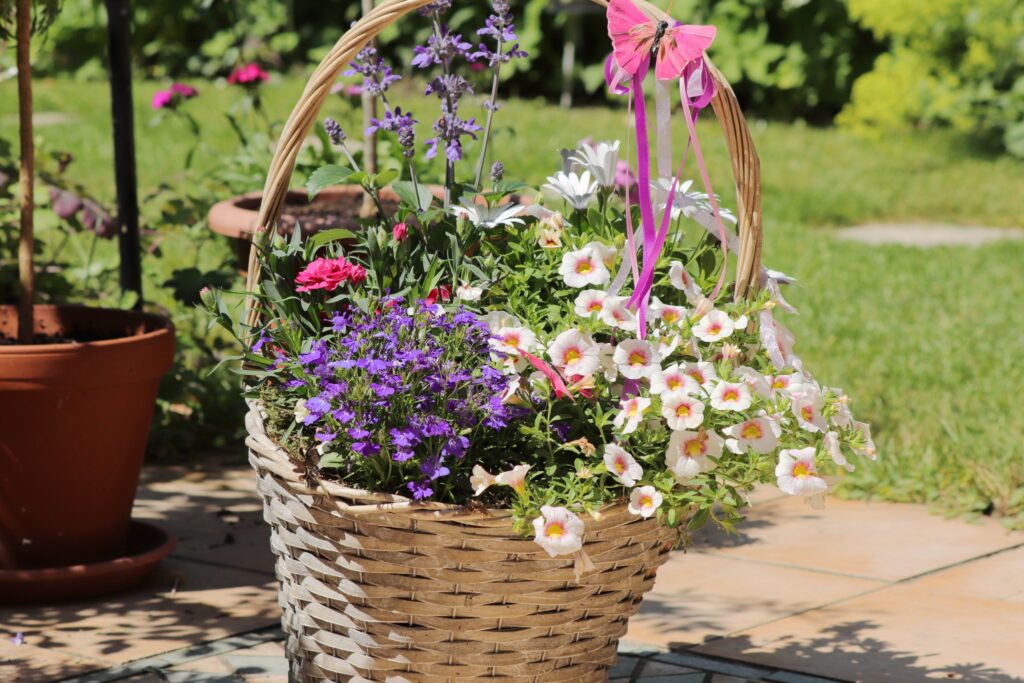
February 2024
Making Valentine’s special

Our hosts have been busy making Valentine’s day extra special for their guests.
Sarah our host in Hassocks had help from two of her guests to make some home-made biscuits to accompany her chocolate and orange pots.
An Insta-worthy creation

Our host in Tisman’s Common went all out to create an extra-special cake to celebrate the birthdays of three of her guests, who all have birthdays within days of each other.
It exemplifies the relationship that develops between our amazingly generous and talented hosts and their guests.
Sara, who is responsible for this stunning creation, says: “When I tell people what I do, the most common response is ‘oh, how lovely’, and that’s exactly what it is. It’s more than a job. It’s about giving back to a community of people who deserve to get out and have a lovely day. I have the pleasure of being able to provide that. Their smiles at the end of the day are my biggest reward.”
Will you be watching tonight?
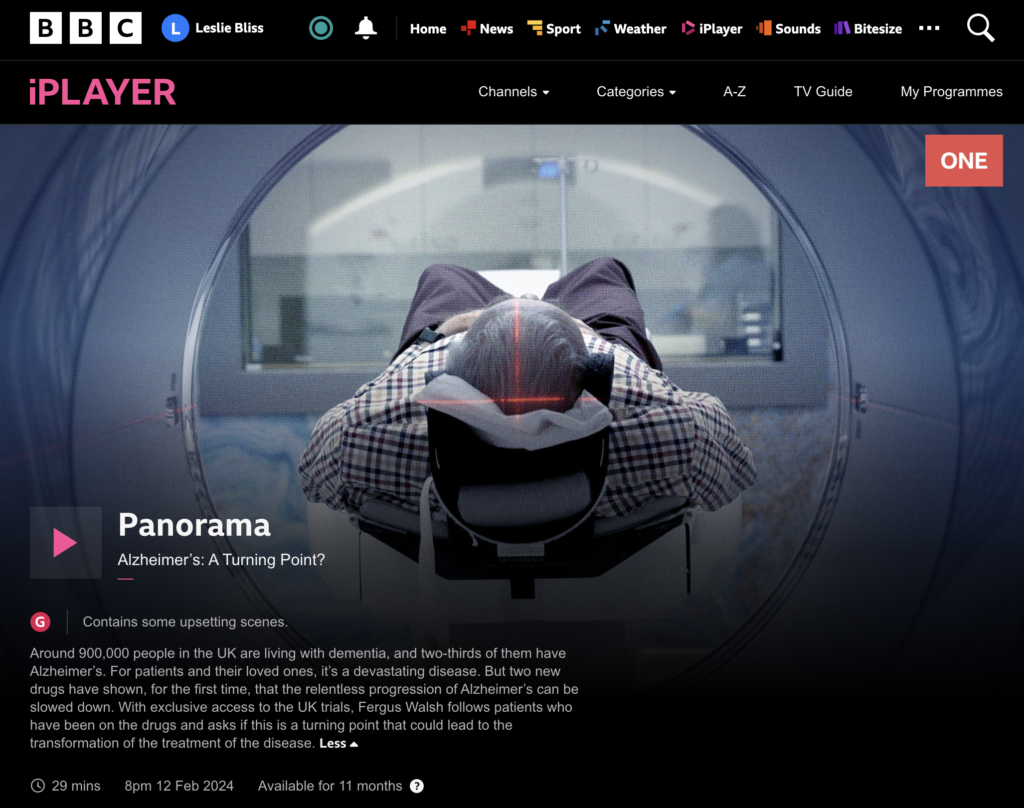
Alzheimer’s – the most common form of dementia, long regarded as the NHS’s biggest time bomb – is the subject of tonight’s Panorama on BBC One at 8pm.
Fergus Walsh follows patients with the disease who have been taking two new drugs that have shown to slow down its progression. Is this a turning point in treatment?
Here’s hoping there’s hope.
https://www.bbc.co.uk/iplayer/episode/m001wb1t/panorama-alzheimers-a-turning-point
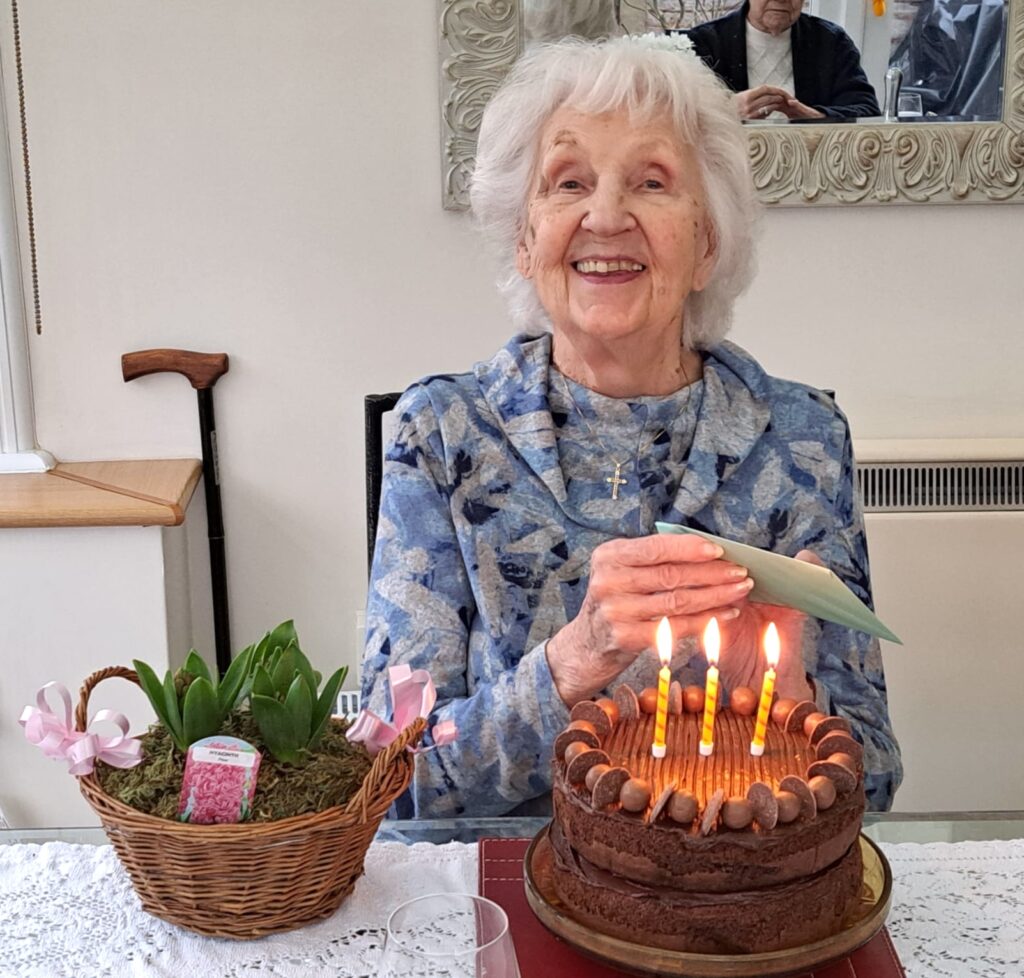
A regular member at our Mannings Heath Tapestry Day Club for the past couple of years, Chris celebrated her 91st birthday in traditional TDC style, together with other guests, sharing a delicious home-made cake.
Chris’s life certainly is a rich tapestry. With her late husband, she moved down to Sussex from Lancashire to start married life there in the 1950s. A trained bookkeeper, she worked for Rudgwick builders merchants Hoad & Taylor as well as the RSPCA for 10 years. Chris also qualified as an auxiliary nurse and worked in the maternity ward at the then newly built Crawley Hospital in the early 1960s.
Being married to a consulting engineer involved lots of travel and entertaining, so Chris became an excellent cook, completing a cordon bleu correspondence course while living in Scotland in the 1970s.
Chris’s 60-year marriage included accompanying her husband when he was posted as resident marine and mechanical engineer on the Sarcheshmeh copper mine in Iran in 1975. Here he was presented to the late Shah Reza Pahlavi on completion of the mine’s main water pumping station. Today, a photo of her husband with the Shah still has pride of place in her home.
Then there was the time Chris joined her husband for an extended holiday when he was working on the Southern Chad irrigation project in Nigeria in the early 1980s. They went on safari in Cameroon. One of the tribal chiefs took a liking to Chris and asked her husband if he could marry her!
Another significant time abroad was four years living in Sri Lanka when her husband was resident engineer on the Victoria Dam. Mainly funded by a UK grant, it was opened by PM Margaret Thatcher in April 1985.
Following retirement from the RSPCA, Chris went back to college in Horsham and completed the Cambridge Information Technology course. She also completed a course in aromatherapy and enjoyed offering treatments to friends, family and neighbours.
Chris has two children and three grandchildren. She joins our club twice a week and enjoys reading, walking, gardening and crafts as well as singing, games and cooking.

Time to talk
Today, 1 February, is Time to Talk Day. It’s a day for friends, families, communities and workplaces to come together to talk, listen and change lives.
Talking about mental health isn’t always easy and sometimes it’s even harder to verbalise how you really feel. But a conversation has the power to help others.
This is the third Time to Talk Day, which is run by the charities Mind and Rethink Mental Illness in partnership with Co-op.
For more information to find out how to have a conversation about mental health, visit timetotalk.co.uk
January 2024
Team building
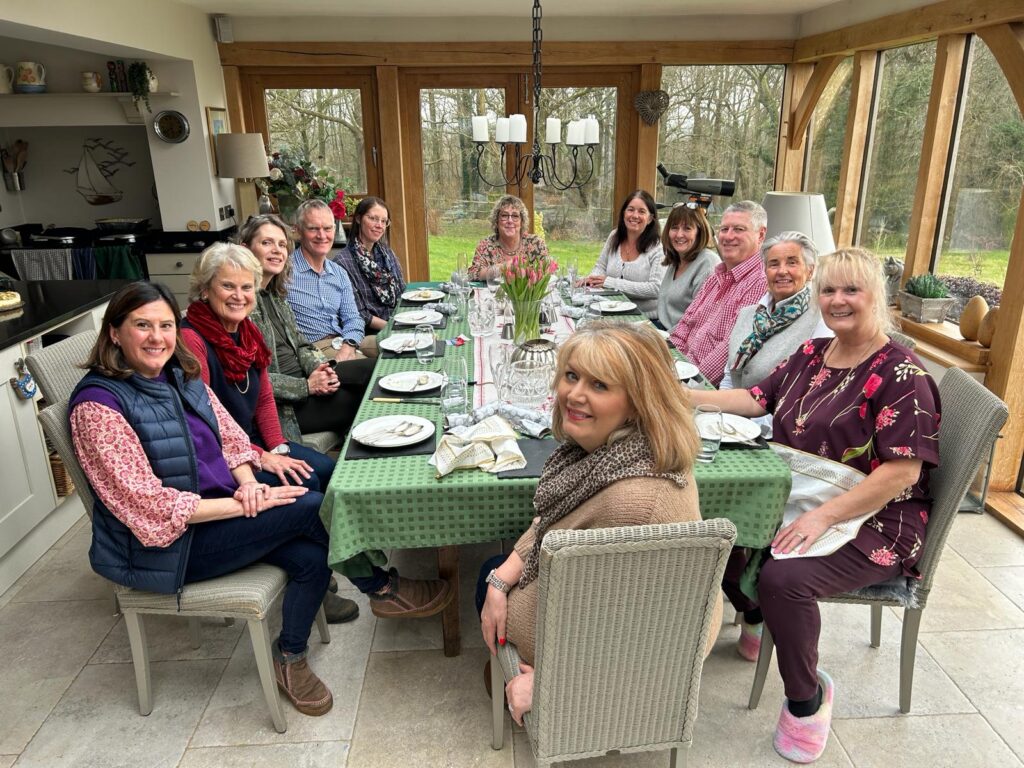
Every few months, we like to have a get-together with all our hosts. The group has grown so much in the past year, we can only just fit around co-founder Anderley’s dining table now.
It is such an important ritual as we all share our thoughts and ideas to support each other and make our club the best it can be.
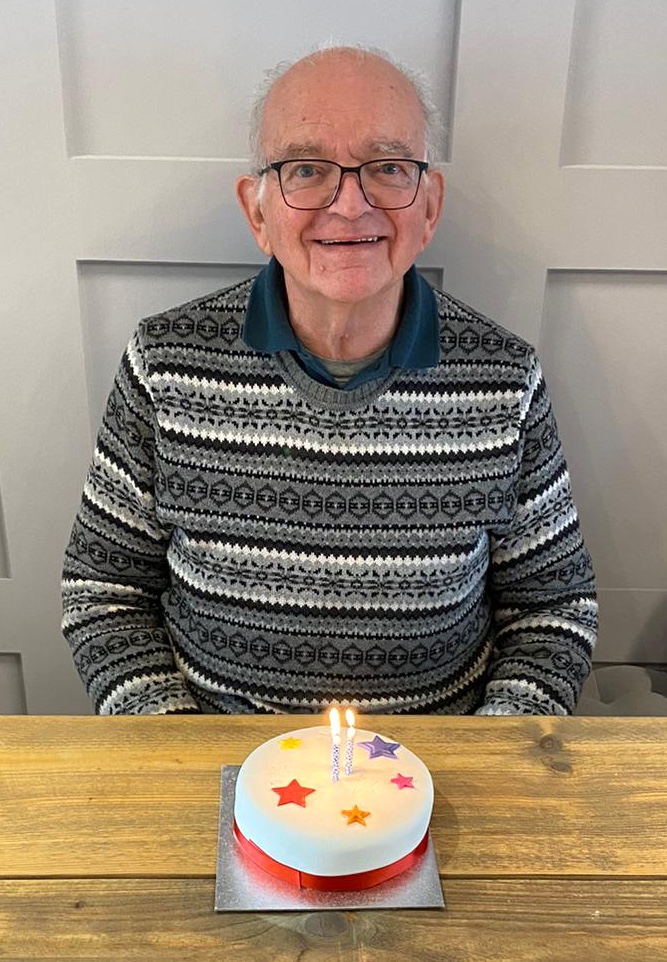
One of our new guests, Brian, recently celebrated his 78th birthday with one of our new hosts in East Grinstead together with other guests.
Brian was born in Kent, an only child. He started his career as a trainee at Lloyds Bank and worked his way up to become a senior manager, running more than six branches in West Sussex. He met Carol, another bank employee, back in 1966 and they married two years later, raising two sons.
Following early retirement aged 53, Carol and Brian have been travelling extensively, loving New Zealand in particular, as well as the US, which they visited as recently as last summer.
A former parish councillor and an active member of his local community, Brian loves sport: cricket, rugby and badminton. He also enjoys Sudoku, crosswords and board games, especially Rummikub, which is popular across the whole of Tapestry Day Club.
‘Doing the right thing’
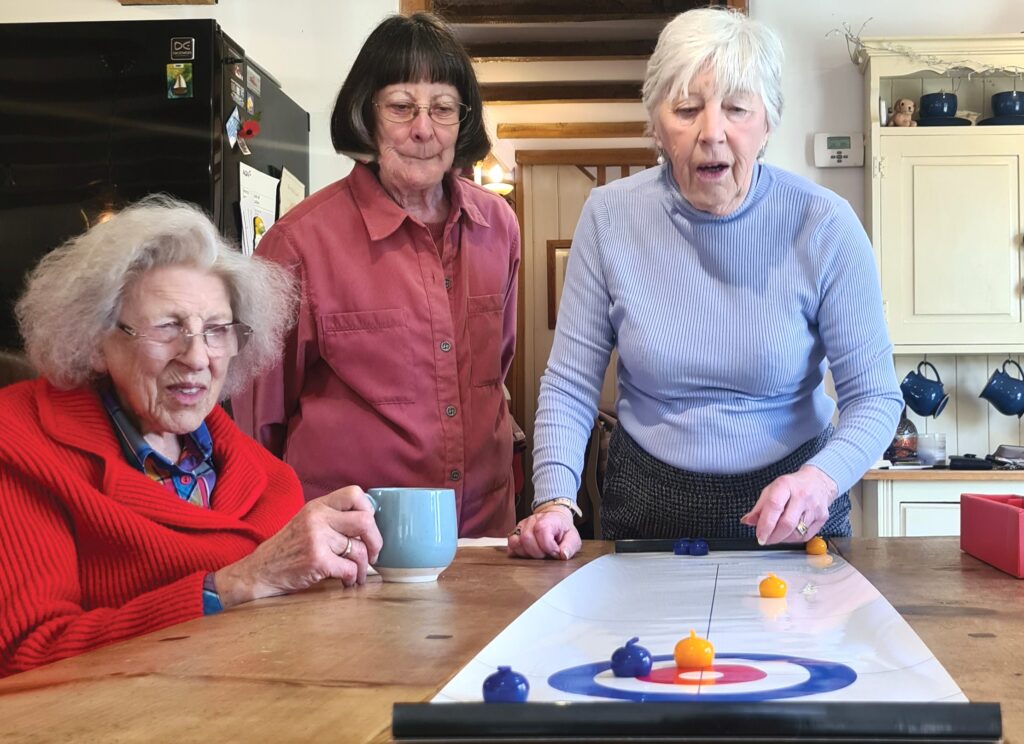
It’s been a wonderful start to the year with lovely feedback from one of our newer guest’s family members.
Apparently, the partner of one of our guests called a family member in tears of relief, having read our host’s daily report about how their spouse spent their day at our club.
He said: “Now I know I’m doing the right thing.”
Everyone needs a break when caring for someone with dementia; it is challenging.
At the end of each club day, our hosts write a report about their day in general, the activities as well as the food they provided. In addition to that, each host writes a few words about each guest individually, whether they were happy, took part in the activities and ate well.
We’ve found it has become an invaluable reference source to alert our guests’ families of any issues or deterioration in health, and it allows family members to know how we care for their loved ones.
In this instance, it is so rewarding to hear how one of our hosts has made such a big difference to this family.
December 2023
Joy to the World
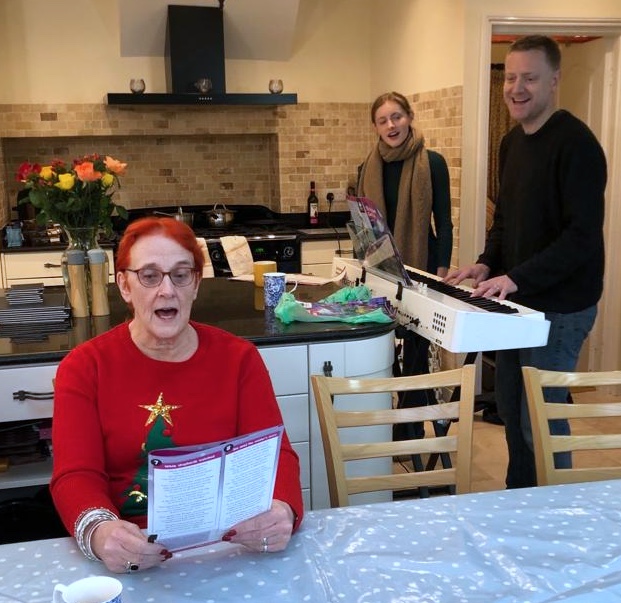
This year, a couple of our hosts’ Christmas parties turned into somewhat special events thanks to the musical talents of Southwater pastor Dave Taylor and his daughter Izzy, who kicked off the festivities with some carol singing.
Thank you, Co-op!

We would like to give a big ‘shout-out’ to the Co-op Cranleigh store for their generous gifts towards our hosts’ Christmas parties. Their award-winning mince pies and chocolates will allow the club days to be extra special for our guests in the final week leading up to Christmas when all our hosts put on Christmas parties.
What’s the point?

A friend recently asked whether there’s any point in going to see someone with dementia. Why bother if they can’t remember you’ve been minutes after you’ve left? The answer is a resounding YES. Because the emotions, the sense of happiness, a visit or outing evoke is what it is all about. Those feelings remain for hours, sometimes days.
It is explained brilliantly in the free online Alzheimer’s Society’s Dementia Friends information sessions. Imagine your memory as a rickety bookcase, with your earliest childhood memories as books on the bottom shelf and your most recent ones on the top shelf. When you have dementia, that bookcase wobbles more and more, and the books at the top fall off the shelf.
This memory bookcase sits next to your well-built emotional bookcase containing the emotions associated with each memory. For example, you may recall how you loved a particular subject at school because of a kind, fun teacher. This bookcase is strong, it doesn’t wobble, it lasts much longer.
Dementia is a disease of the brain that can affect anyone at any age and affects everyone differently. There are more than 100 different forms. Think of the brain as a set of fairy lights, with each light having a different function. Some lights become dimmer, some start flashing, some stop working.
Apart from memory, it can affect motor skills, sequencing, inhibition, communication and visual perception. So, listen, repeat back what they’ve said to give confidence, speak clearly in short sentences, don’t bombard with questions and give them time to process questions and formulate answers. In some cases, it helps to reduce distractions, such as turning off the radio and TV. Sometimes, using photos will help jog the memory.
When vision is affected, a white light switch on a white wall may be difficult to see, as will a white sandwich on a white plate. A black floormat may look like a hole in the ground, a shiny floor my appear wet.
A lot of research has gone into how newly diagnosed people feel; tragically, it’s lonely and isolated. There is more to that person than their dementia. It is possible to live well with this disease and you can help them to do just that.
It’s good to talk

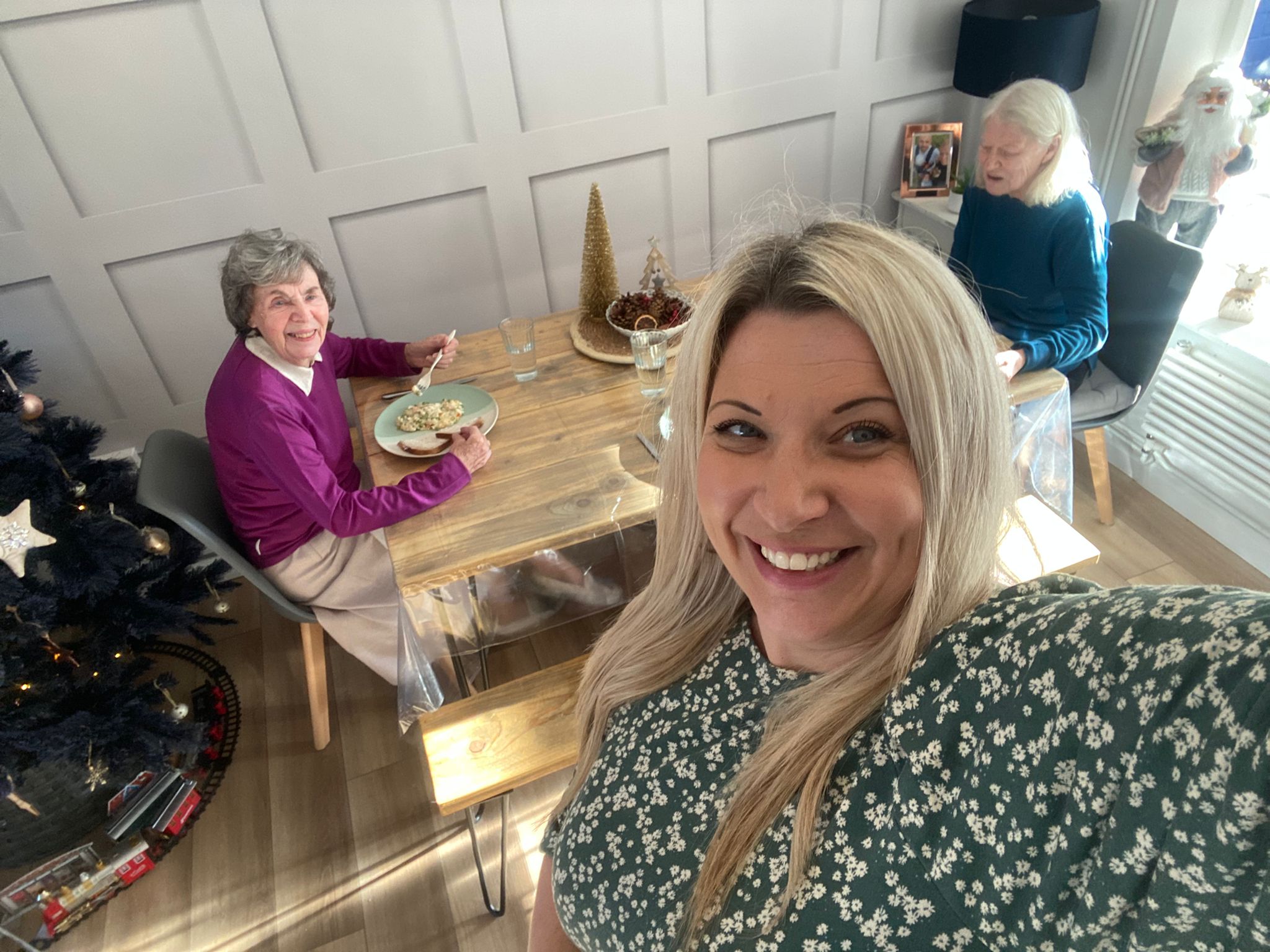
Here is one of our newest hosts, Lucie in East Grinstead, proudly presenting her fish pie. This was followed by mince pies with cream. As these particular guests love a good chat, there was only time for a few word games this week.
Get into the Christmas spirit!
If you live in the Crawley/Haywards Heath area, do come and can support these two Alzheimer’s Society events. Thank you!


Hear, hear!
Great to see Jeremy Clarkson using his fame for a good cause in Mail Online today, raising awareness of the link between dementia and hearing loss. Hopefully it will encourage more people who need hearing aids to use them, particularly as some of the modern ones are practically invisible.
https://www.dailymail.co.uk/tvshowbiz/article-12801719/jeremy-clarkson-health-update-dementia.html
November 2023
More than a job
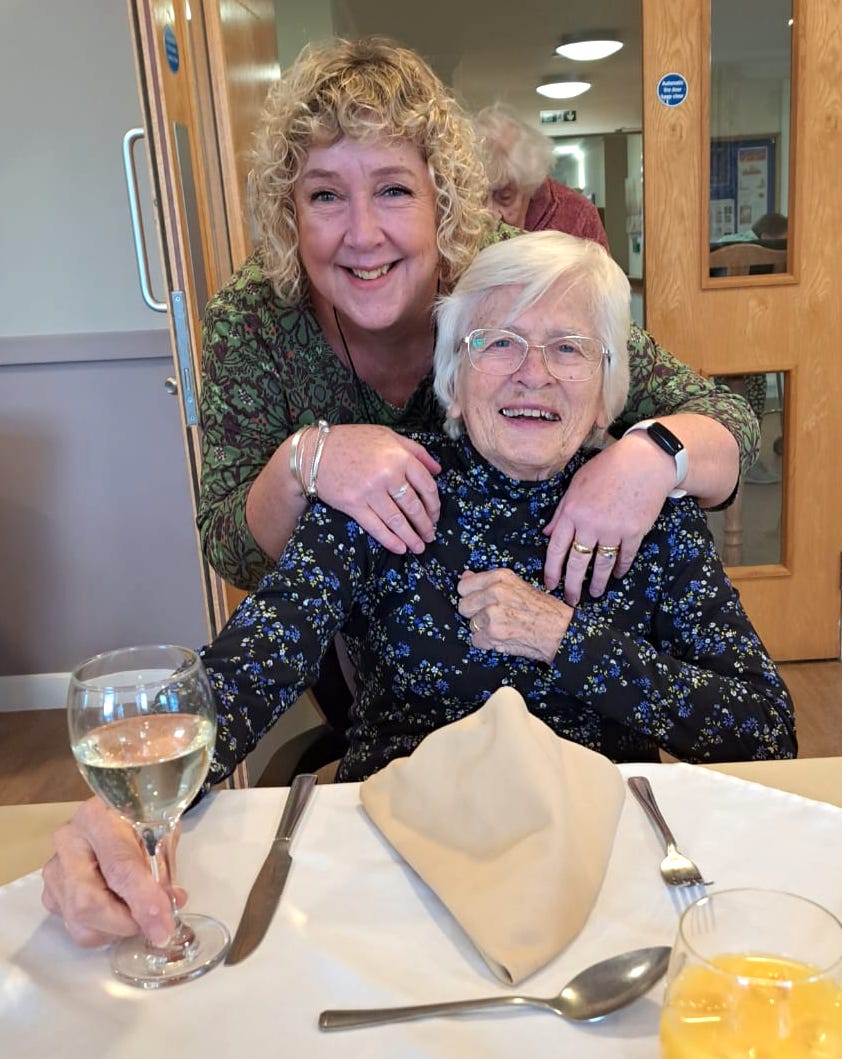
When our hosts welcome guests into their family homes and provide them with home-cooked food and a stimulating day of socialising, they obviously become fond of the people in their care.
Friendships blossom, especially after two years of twice-weekly visits with one host (this particular guest also enjoyed a third day per week with another host).
It is the nature of the job that some of our guests reach a stage where they need 24/7 care, but this doesn’t mean that friendships have to end. Our host Trudi enjoyed visiting one of her former guests, who has recently moved into a nursing home.
“She kept saying what a lovely surprise it was and that she couldn’t believe it. She looks healthy and her mobility has improved, and she is so happy. We had coffee and cake in the café and her son booked us in to have lunch with her, which was lovely,” Trudi said.
Marking a milestone
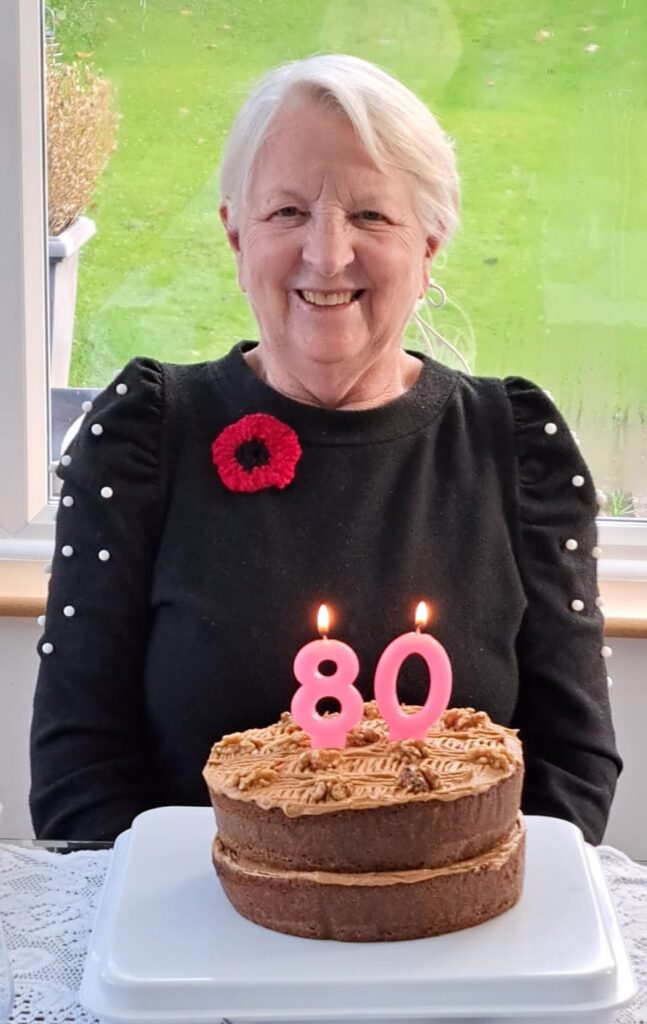
Jill may only have joined us a few weeks ago, but we always like to celebrate birthdays in style, especially milestones. As is her tradition, our Mannings Heath host Trudi pushed the boat out to make a special cake for Jill to enjoy together with her other guests.
We like to mark the occasion by sharing the wonderful and varied life stories of our guests. In Jill’s case, her marriage is a rather lovely love story. Growing up in New Cross, London, she first met her future husband George when she was just 12 years old and he was 16. They met again in 1965 and married in 1967, setting up home in Deptford near Lewisham.
In 1975, they moved to the countryside, near Rochester, Kent, before moving to Handcross in 2021 to live near their daughter. For many years while living near Rochester, Jill was part of a community of farmworkers, picking strawberries and apples. She also worked in office admin.
Jill and George have two children and five grandchildren.
Find out more about us
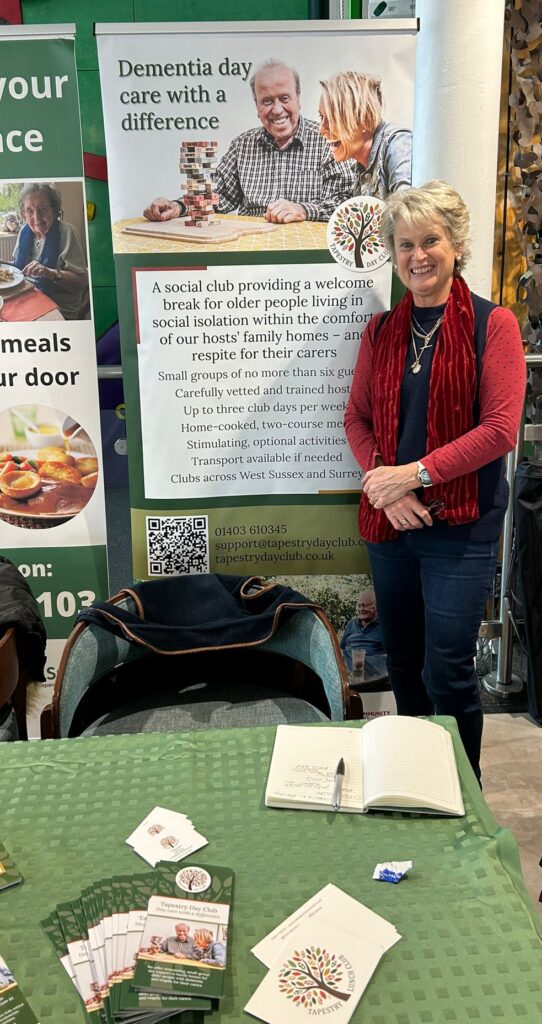
Living well with dementia – that’s the name of the free community event at The Bridge Leisure Centre in Broadbridge Heath near Horsham on Monday 13 November 10.30am-1pm.
Part of Self Care Week, it is an opportunity for anyone with dementia and their families to meet organisations and groups that provide support. Of course, Tapestry Day Club will be attending, so do please pop in to meet one of our founders, Anderley Wade.
New hosts, new areas!
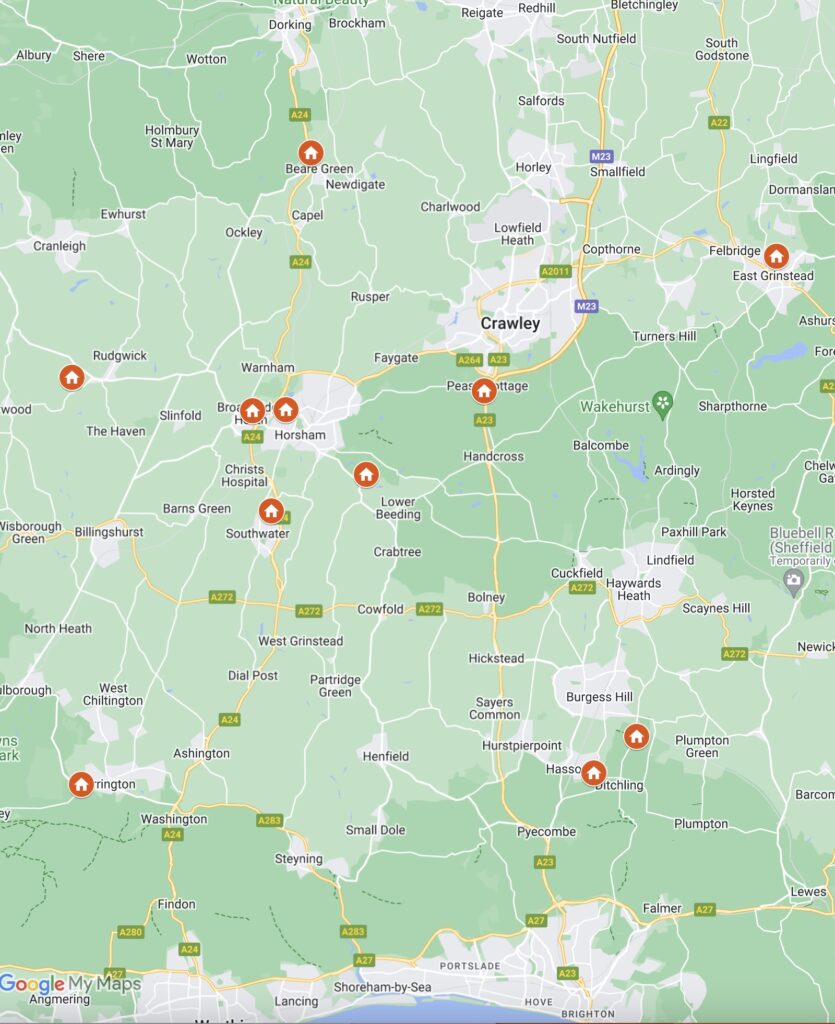
We’re ever so chuffed to announce we are doubling our capacity. We can now offer day care in the comfort of our hosts’ family homes for many more people living with early-stage dementia, also in completely new areas.
It has been proven that regular social contact slows the progress of dementia. This is why we operate three days a week – Tuesdays, Wednesdays and Thursdays – allowing friendships to flourish.
Our carefully vetted and fully trained hosts all share a love of entertaining. They provide a home-cooked, two-course lunch as well as optional memory-boosting activities tailored to the specific interests of the individuals within each group. And we can usually provide transport, too.
Our new hosts pass first aid training course with flying colours
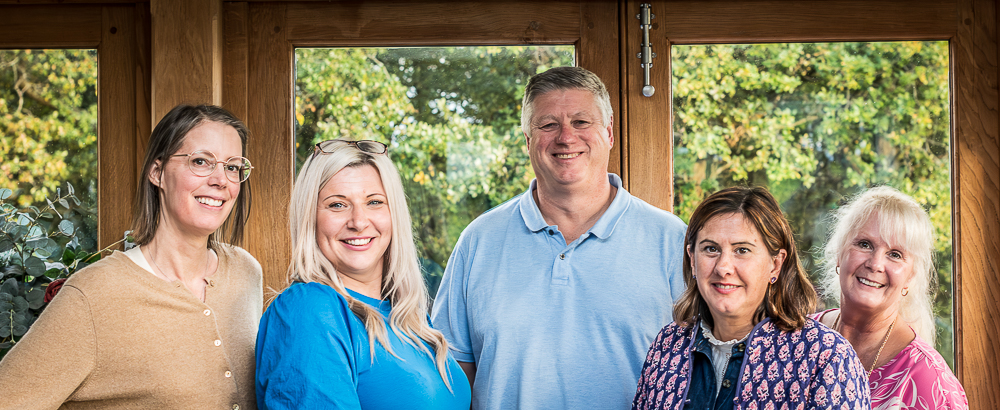
All our new hosts have now completed their comprehensive training program, including the Emergency First Aid at Work, which everyone passed with flying colours. A big thank you to our superb instructor, Nikki McIvor from Purple Aid Training.
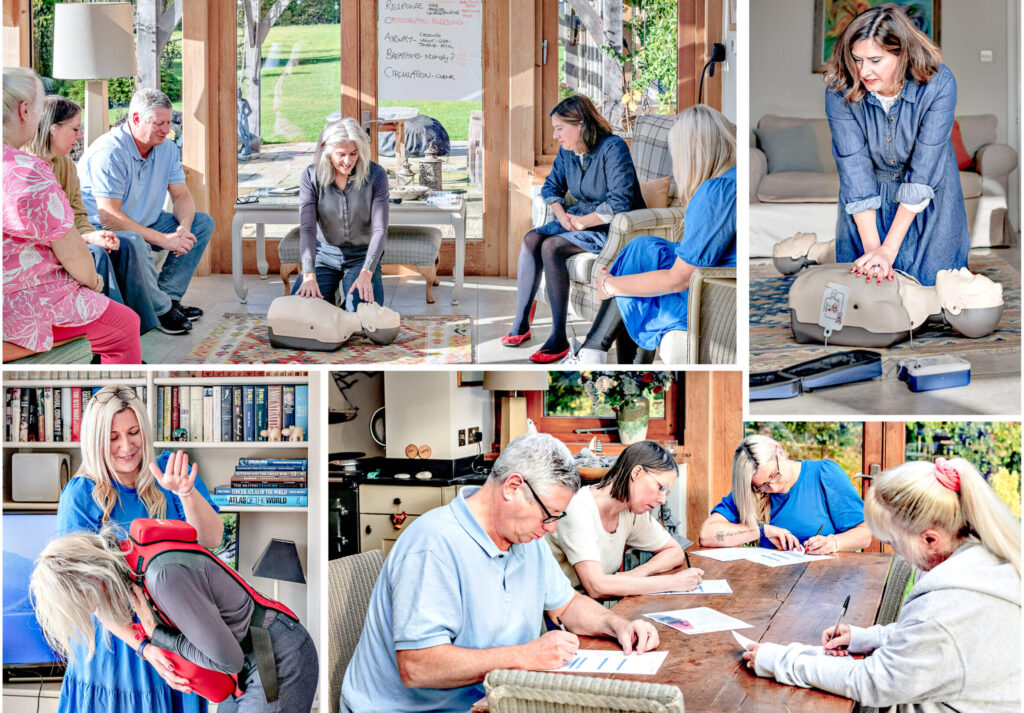
Another amazing home-baked cake!
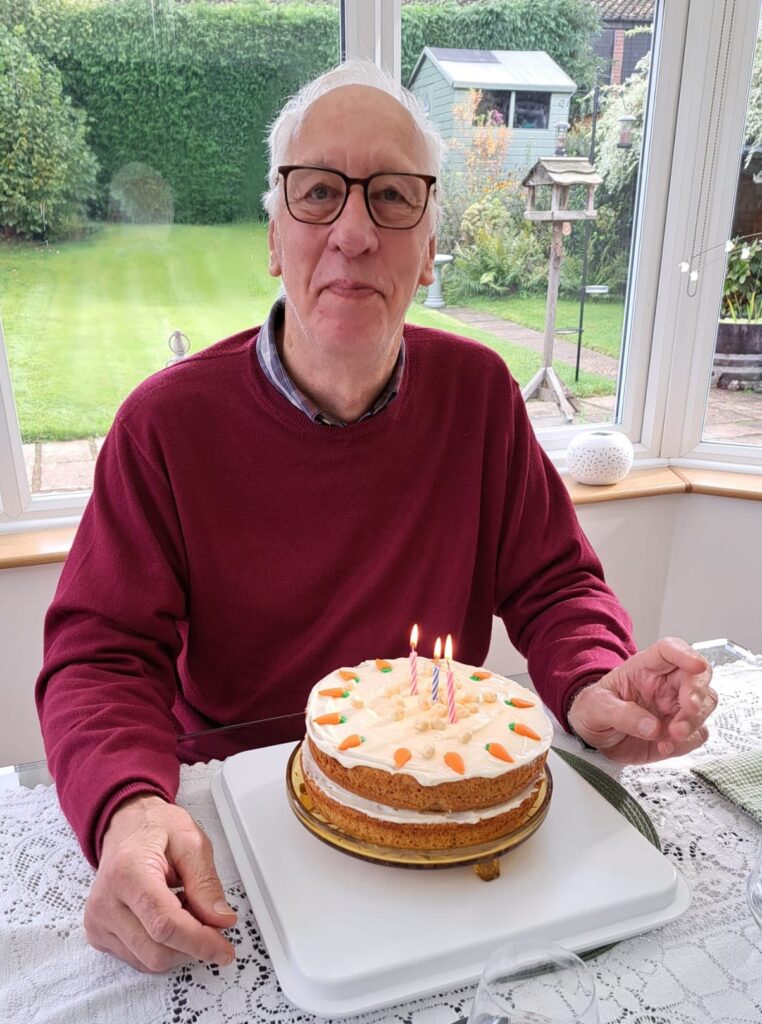
The tall, gentle Graham enjoyed his 77th birthday celebrations with our Manning’s Heath host and guests recently. Trudi baked his favourite – a carrot cake – for the occasion.
Graham has lived with his wife of nearly 40 years, Susan, in Horsham for the past 30 years. Before that they lived for a short period in Saudi Arabia and to this day the couple enjoy travelling and going on cruises, particularly since his retirement in 2011.
During his career, Graham worked on aircraft as a mechanical engineer. He then changed over to working on machines for cancer treatment for Varian Medical Systems. His passion is aero modelling and he has created model aircraft capable of flying.
As someone who loves using his hands, Graham enjoys carpentry, gardening, cooking, music, singing, sewing – and jokes about how he would have liked to join the WI. In addition to that, he enjoys playing pétanque every week with the Horsham & Shipley Community Project.
Tapestry Day Club’s host Trudi has had the pleasure of his company on a weekly basis for more than a year now.
October 2023
Why exercise is the best medicine

Scientists believe that a hormone released during exercise helps protect against Alzheimer’s disease.
A team at Massachusetts General Hospital (MGH) has found that the hormone irisin, which is made by muscles during exercise and helps regulate glucose and fate metabolism, reduces the sticky amyloid plaques that stop brain cells from communicating.
The researchers discovered that irisin tells immune cells in the brain to produce neprilysin, an enzyme which breaks down amyloid.
Not only does it show how exercise can be an effective way to prevent dementia, but also the findings could lead to new strategies to treat Alzheimer’s.
https://www.massgeneral.org/news/press-release/irisin-may-reduce-alzheimers-plaque-tangles
Another completely separate study recently published in the journal Jama also suggests that older adults (60-plus) who spend 10 hours a day or more sitting or being inactive may be at increased risk of developing dementia.
Source: https://jamanetwork.com/journals/jama/article-abstract/2809418
Why is there still shame?
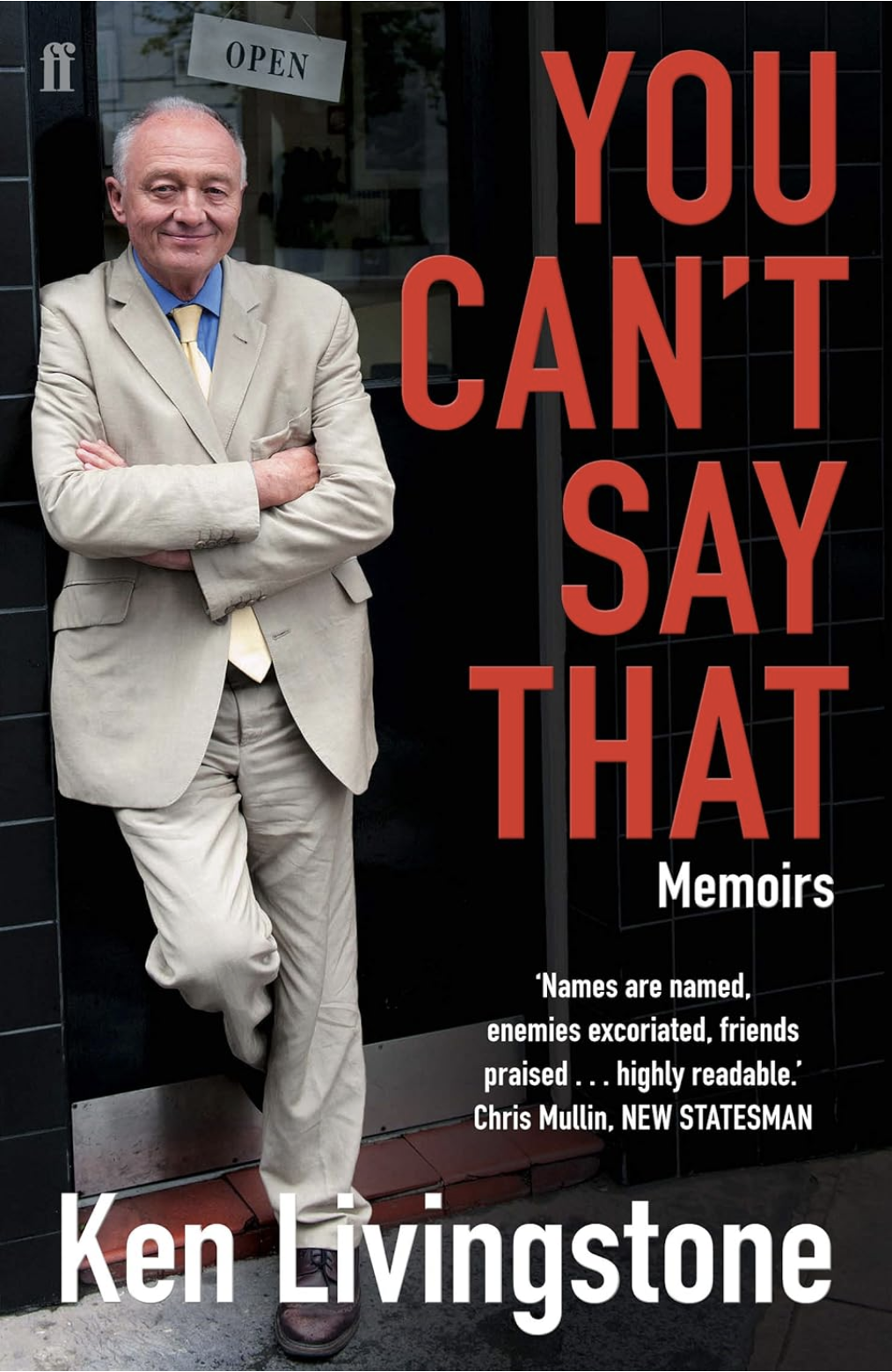
It was announced recently that another high-profile public figure, Ken Livingstone – controversial former Labour MP, head of Greater London Council and mayor of London from 2000 to 2008 – is living with Alzheimer’s disease.
Aged 78, he has officially retired from public life. The news comes after journalists Fiona Phillips and Alastair Stewart decided to share their struggles with the disease earlier this year, Fiona aged just 62.
We at Tapestry Day Club are so grateful to them and their families for their openness about this disease as we see many people living with dementia who are embarrassed by their illness and live in denial. This only adds stress.
It has been established that it is possible to reduce the risk of developing dementia and slow down its progress through lifestyle. Socialising, engaging with other people, is so important, which is why we do what we do; providing day care in a family home in a small group, so our guests can build lasting friendships.
We’ve surpassed our record again!
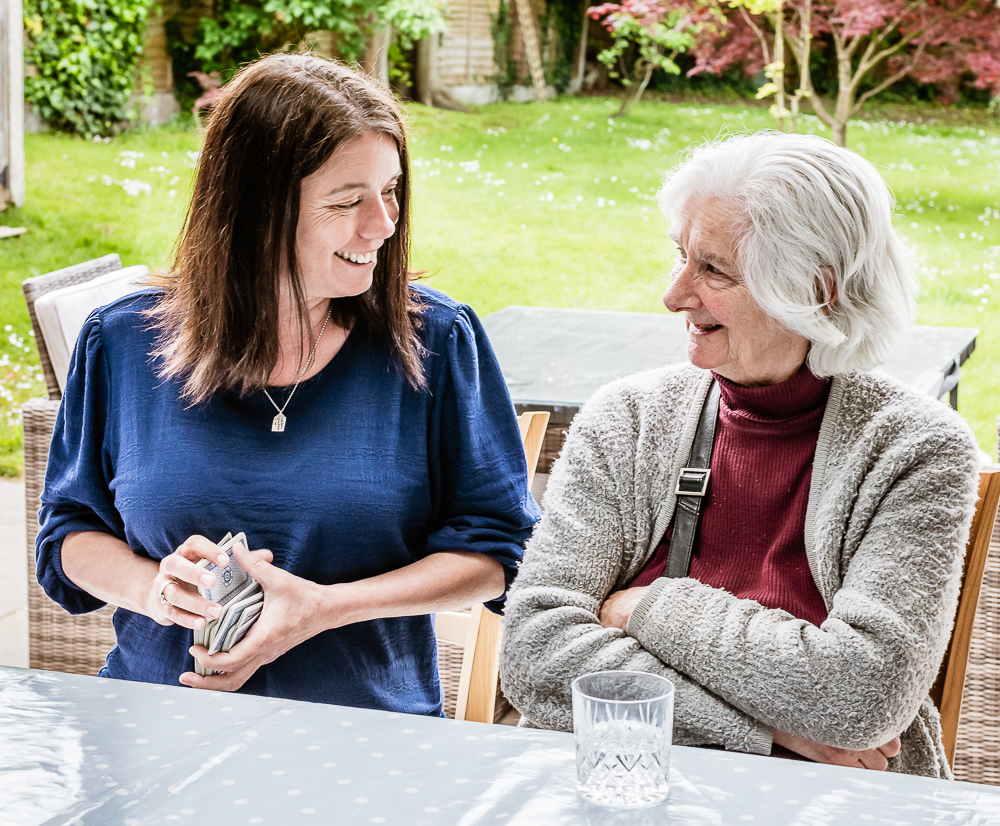
Tapestry Day Club has provided just shy of 3,000 hours of “me time” for the carers of older people living with early-stage dementia or in social isolation in the most recent financial quarter. This sets a new record of hours of respite we’ve provided to carers in any quarter since launching in 2019.
Our north Horsham-based host – known as Metronome Kate (pictured with one of her guests) for her unflappable nature – has provided a staggering 1,092 hours just on her own by working three days a week.
Two other hosts – based in Storrington and Beare Green – have increased the number of club days they run and also built up the number of guests they welcome into their home – on some days to the maximum of six.
Even our newest host in Ditchling has facilitated 132 hours, despite having three weeks off, working once a week and providing day care for two guests.
We are about to train several new hosts, which will increase the areas we can provide support for. The four confirmed so far are based in East Grinstead, Hassocks, Southwater and Broadbridge Heath. So, if you know anyone in these areas who might benefit from our club, please pass on our details.
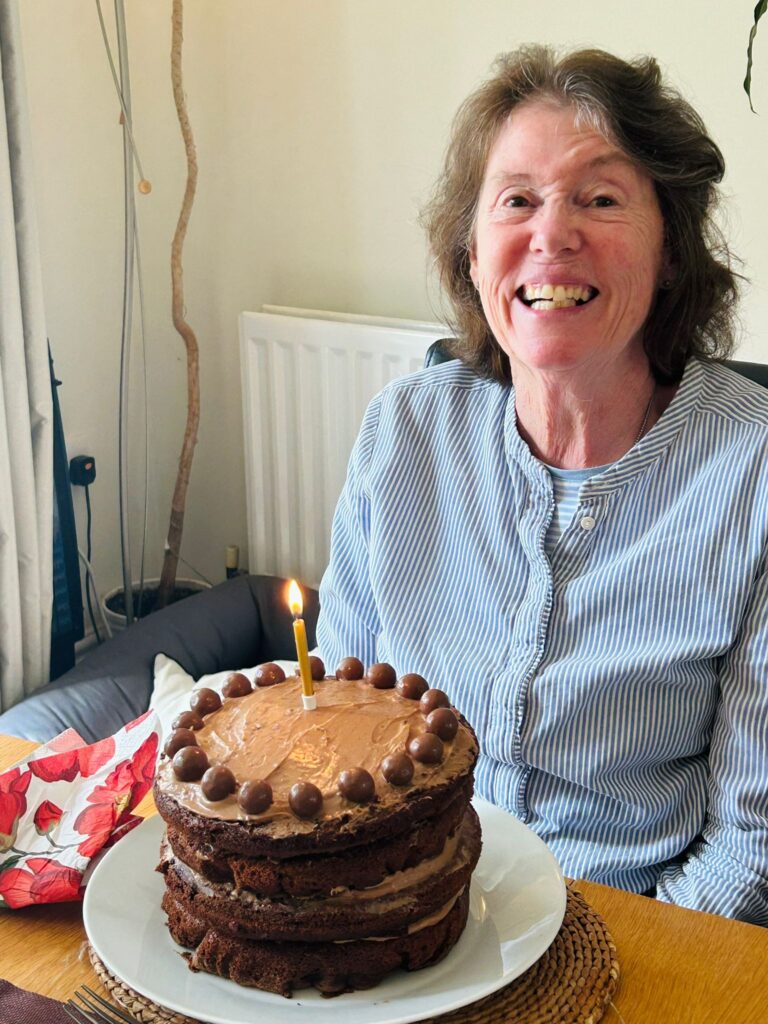
Our host in Storrington, Katie, managed to turn a near baking disaster into a delectable triumph of a birthday cake for our guest Sandy, who recently celebrated her 74th birthday with other club members.
The cake wasn’t meant to be quite as enormous as it turned out as Katie explains: “I had a slight seepage out of my loose-bottomed cake tins as I only lined the bottoms, not the whole tin as instructed in Nigella’s Feast book for her chocolate Maltesers cake. So, I made two more sponges, hence there were four layers, not two. I sent all the guests home with two more slices!”
As a former primary school teacher and with a positive, can-do attitude, the story behind the epic cake was much appreciated by Sandy – as was the cake, of course. Having raised four daughters with her late husband Howard and with four grandchildren, she knows all about the challenges that can occur in the course of making someone’s day special.
Wishing you many more happy birthdays, Sandy!
Adding to life’s rich tapestry
Because of our name, Tapestry Day Club, some people – not entirely unsurprisingly – assume our guests actually make a physical tapestry.
Of course, we would do this if any of our guests wanted to, but so far, the closest activity a couple of our guests currently enjoy is knitting and crocheting. These ladies attend our Manning’s Heath club days and are absolute experts.
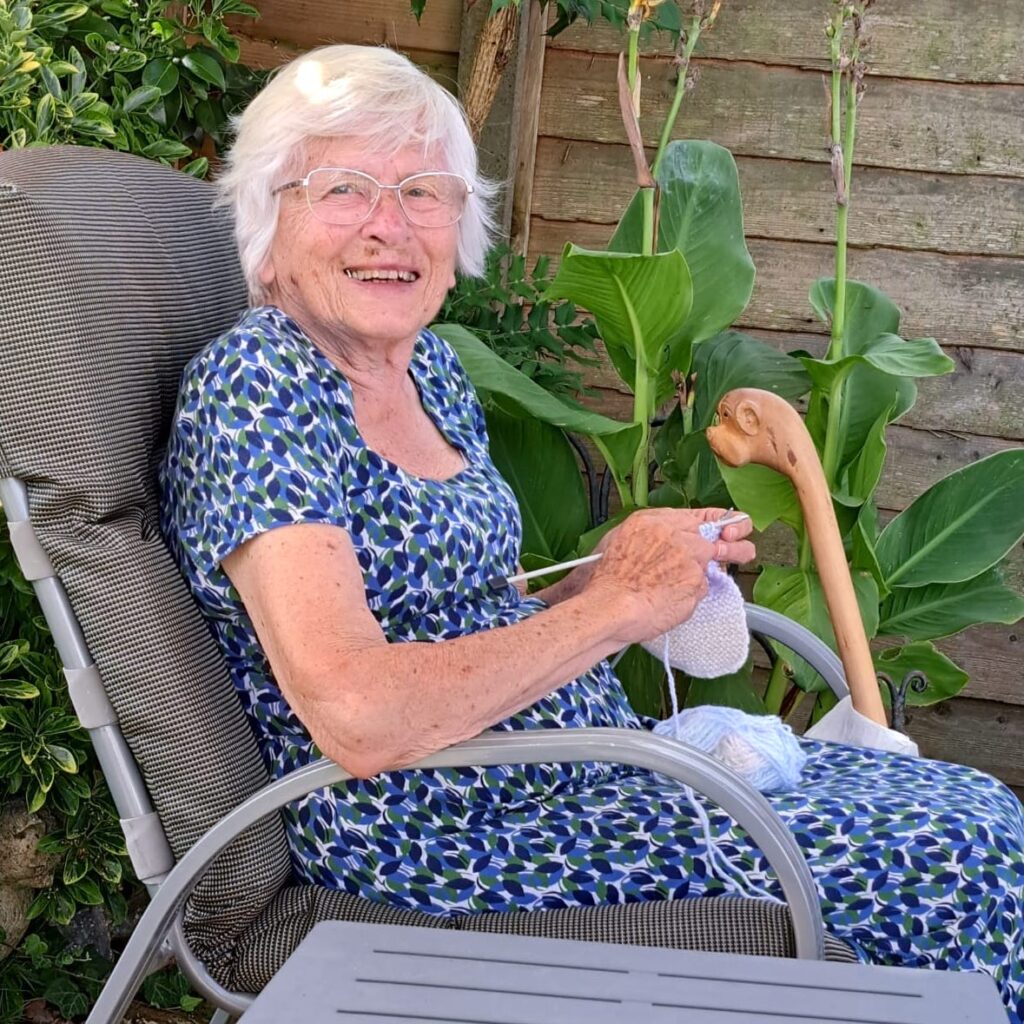
How can we live longer better?
The United Nations decided to designate 1 October as International Day of Older Persons back in 1990 to respond to the opportunities and challenges of an ageing population.
Globally, babies born in 2022 are expected to live 71.7 years on average, that is 25 years longer than those born in 1950.
The number of older people in the world – defined as 65+ – tripled from 260 million in 1980 to 761m in 2021. Between 2021 and 2050, the global share of the older population is projected to increase from less than 10% to around 17%.
However, in Europe and Northern America, it is projected to reach a staggering 27% as these areas have the oldest populations. In a world of eight billion people, this means there will be twice as many people aged 65+ than children aged under-five.
This year’s UN theme is to fulfil the promises of the milestone document in the history of human rights adopted 75 years ago, the Universal Declaration of Human Rights. According to its latest review, age-based discrimination in institutions, attitudes and practices continues to be rampant.
Systemic and structural barriers often exist for older people in the context of work, standards of living, learning opportunities and access to services and resources because of ageist attitudes, discriminatory laws and policies, underfunding and lack of accessibility and affordability among others. These can lead to neglect, abuse and serious health issues; hence the United Nations is urging the world to change the way you think about age.
For more information about the UN’s work to improving the standard of life for older people, visit:
September 2023
Pru & Me by Timothy West
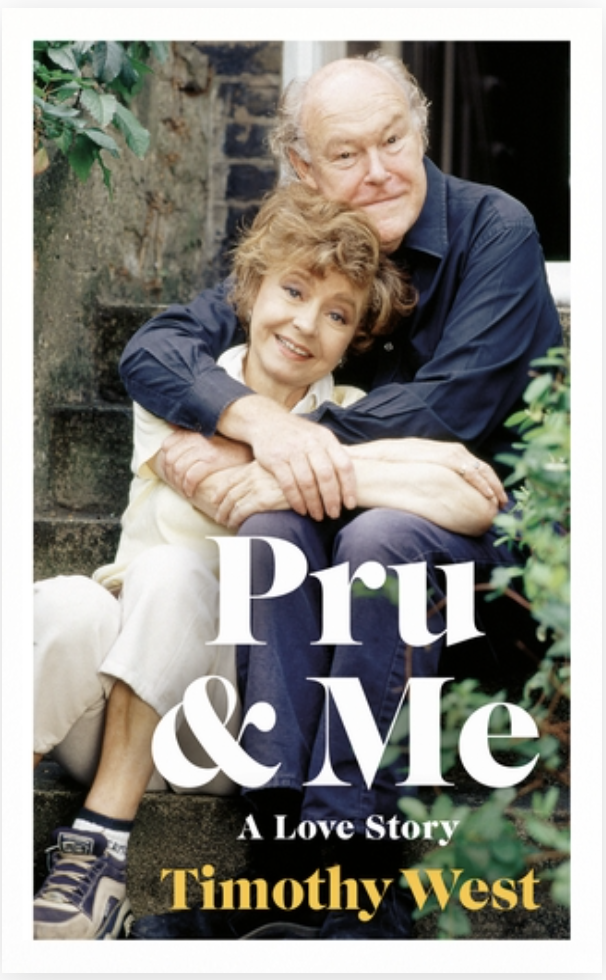
This brand-new book is a heart-warming, first-hand account of one of the most celebrated partnerships in the history of British entertainment, the 60-year marriage of actors Timothy West and Prunella Scales.
It also recounts the day Timothy realised something was wrong with Pru and how it took another 12 years for her to be diagnosed with vascular dementia, a common form of dementia caused by reduced blood flow to the brain.
Timothy actually charts the course of their whole lives, from the years before they met, to their secret courting and marriage. He tells the tale of their journey to establish themselves at the heart of British theatre, television and film across 70 years, most notably in Fawlty Towers and Brass.
Pru & Me also recounts their later blaze of glory. First aired in 2014, Channel 4’s Great Canal Journeys introduced the world to the real Tim and Pru. Here, the couple charmed the nation while talking frankly about Pru’s struggle with dementia.
The book is full of funny, poignant, jaw-dropping and occasionally painful stories. All in all, despite the reality of the situation and challenges, it is an uplifting story of how they have adapted and their bon ami has seen them through some difficult times.
Pru & Me by Timothy West (Penguin Michael Joseph, £22) is for sale on 28 September.
To read Daily Mail’s extract from the book, visit https://mol.im/a/12497839
You have a one-in-five chance of developing this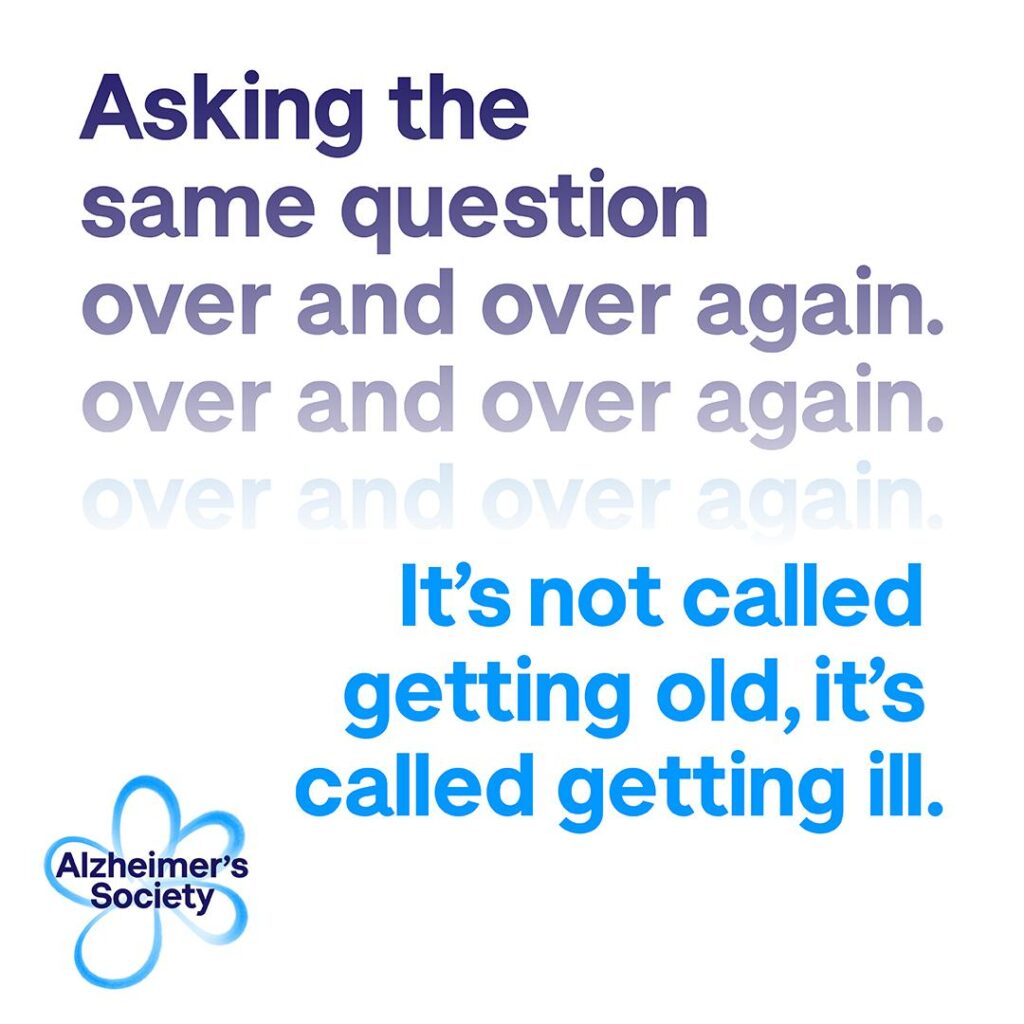
Today, 21 September, is World Alzheimer’s Day. It was launched in 2012 because, on average, two out of three people globally have little or no understanding of Alzheimer’s disease or dementia.
So here are 10 facts:
- Alzheimer’s is a progressive disease that impairs memory and other mental functions.
- Alzheimer’s is a form of dementia.
- Dementia is an umbrella term for a range of progressive conditions that affect the brain.
- There are more than 200 types of dementia.
- Nearly one million people in the UK are living with dementia.
- This figure is expected to rise to 1.6m by 2050.
- There are 12 risk factors which affect your chances of developing this disease (see our post from 1 September).
- It is estimated that you can reduce your risk of developing it by as much as 40% through your lifestyle.
- Dementia cost the UK economy an estimated £25 billion in 2021.
- There are many individuals and organisations, such as the Tapestry Day Club, who are working hard to make dementia care more humane, to maintain the quality of life of those living with this disease for as long as possible, to enable them to continue to live independently rather than on a closed dementia ward in a nursing home.
Why you should listen to your body
![]()
Alastair Stewart, who led ITV’s news coverage for 35 years and is Britain’s longest-serving newsreader, recently revealed on GB News that he has been diagnosed with early-onset vascular dementia.
In the in-depth interview, Alastair, 71, talks openly about how he started to feel “discombobulated” when doing simple tasks around the house about six to nine months ago.
He urges anyone who thinks something might be something amiss with them to go and see their GP. Brain scans revealed he had suffered a series of minor strokes called infarct strokes in the past, of which he was completely unaware. The cumulative effect of these are believed to be the cause of his dementia.
“I wasn’t becoming forgetful, but things like doing your shoelaces properly – that’s how I wear these lovely moccasins now – making sure your tie was straight, remembering that the call time for your programme is four o’clock and not five o’clock, not turning up early or late, and stuff like that.”
He has made changes to his lifestyle, including giving up smoking and increasing his exercise, taking his dogs for longer walks – “There are bits and pieces you can do to stop it getting worse” – to keep his blood pressure down, as high blood pressure tends to be the main cause of the types of strokes he has suffered.
https://www.youtube.com/watch?v=_m_mLzKdjrQ
An intrepid traveller
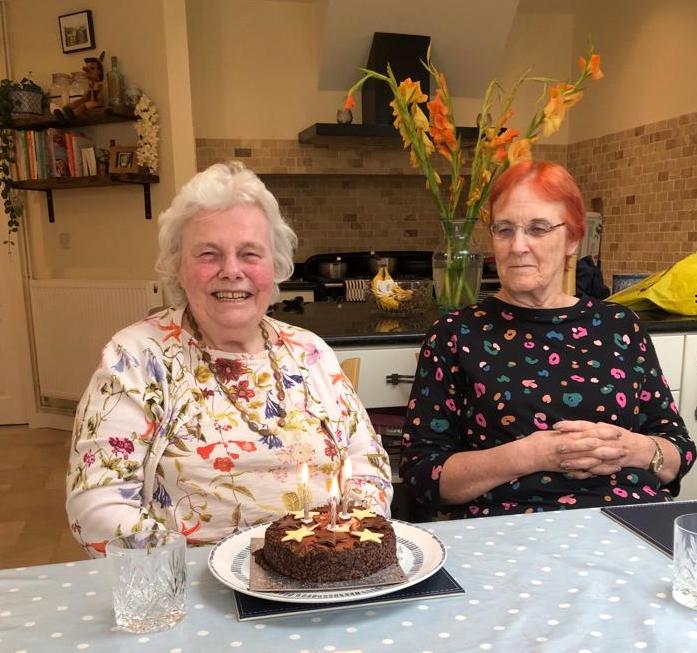
The name Tapestry Day Club was created to encapsulate the idea that everyone has a life story, a rich tapestry. And our guest Susan – who recently celebrated her 87th birthday with our host Kate and other guests in Horsham – is the perfect example of that.
Born in Liverpool, Susan grew up as an only child, her younger brother having died in childbirth. She went to Edinburgh University to read English and initially found work at Liverpool University Press. She moved to London to join the Foreign Office to work in the information research department, where she remained for 10 years.
She met her Syrian husband in London. They lived in Beirut for a short while and Saudi Arabia for a few years, something her sons, Francis and Zafer, consider particularly heroic as a western woman in the 1970s, especially as they were living outside the ex-pat compounds.
They returned to live in Wimbledon and Sue moved to Horsham more than 30 years ago, after her sons left for university. It was her interest in family history and the fact her ancestors had lived there that led her to choose Horsham. Sue’s interest in Horsham history has led her to annotate more than 20 books on the subject.
Sue lives on her own with her beloved black-and-white cat Doppie and enjoys twice-weekly visits to our club.
Working on dementia diagnosis
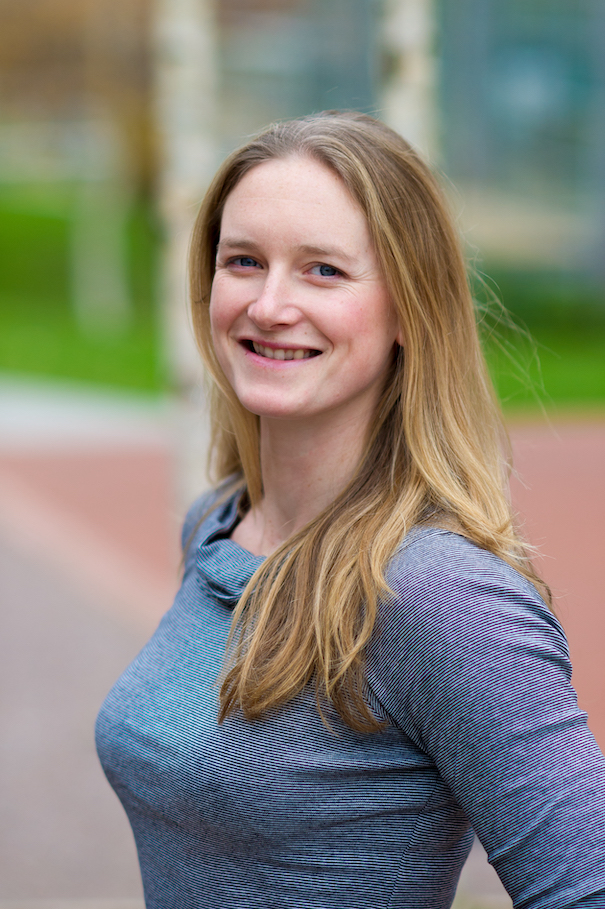
It is exciting to read that £1.9m funding has been granted for an innovative new app to monitor brain health in older people.
The app, designed by researchers at the University of Exeter and King’s College London in partnership with the NHS, will do this through regular cognitive tests, including puzzles and games, which will be able to alert GPs to signs of dementia. It also provides users with brain training to help them maintain brain health.
Dementia diagnosis is difficult for so many reasons, especially as the person themselves is not always aware of it, particularly at the beginning of the illness.
Dr Anne Corbett (pictured), University of Exeter associate professor of dementia research and lead of the PROTECT study, which aims to understand how brains age and why people develop dementia, said: “We know that 99% of people with early signs of problems with their memory and brain health are not seen by a doctor. Yet these are the people who will benefit the most from early assessment, diagnosis, and treatment. Computerised tests of brain health are far more sensitive and accurate than traditional paper-and-pencil tests and using an app means we can reach large numbers of people in an affordable way.
“This programme of research is a major step forward towards better brain health for older adults, harnessing the best technology to support people and doctors alike. It will give us vital information about how to fill the current gaps in healthcare in ageing and provide a valuable new tool to improve health and wellbeing for older adults in the NHS.”
For more information about PROTECT and to join this major study, click https://www.protectstudy.org.uk/
Another birthday, another amazing cake!
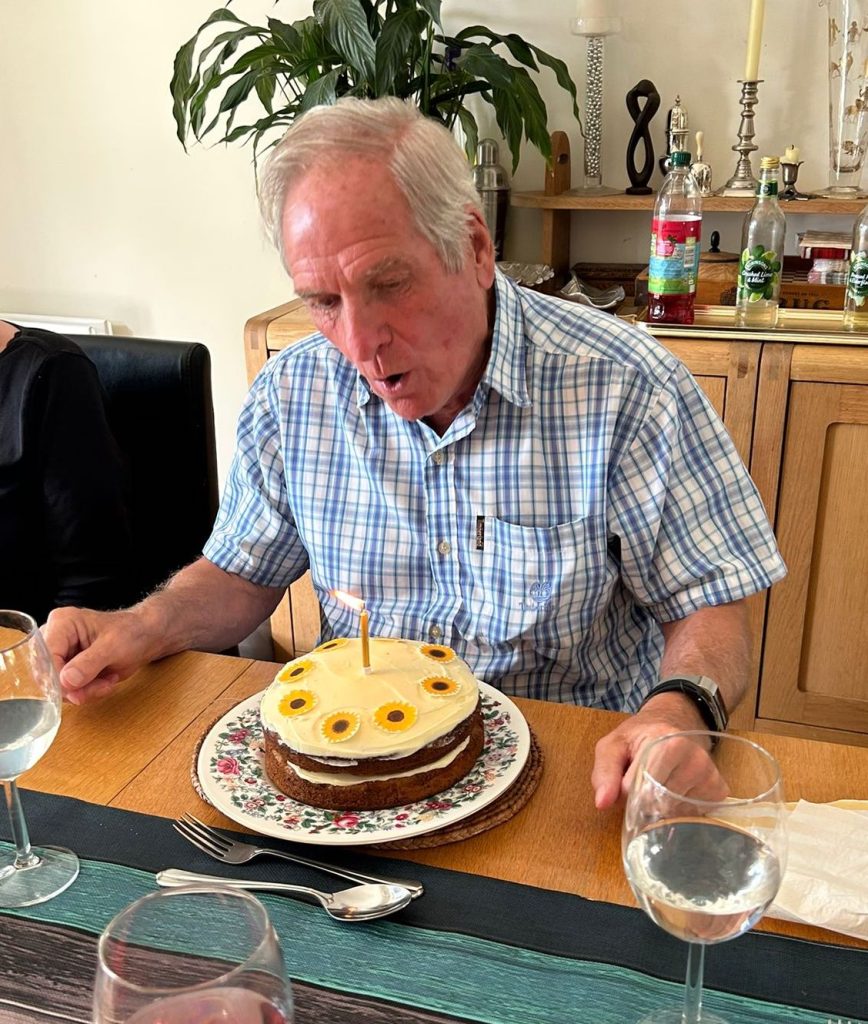
We really are in the midst of birthday season here at Tapestry Day Club and our hosts have been busy creating some incredible cakes. This time it was Alan’s turn. He celebrated his 76th birthday with our host Katie in Storrington and other guests recently.
A gentle and unassuming man, Alan grew up with his brother in West Yorkshire. He studied geography at Goldsmiths, University of London. He then went on to work in retail for most of his life, joining Harris Queensway in his twenties, which at the time was a huge empire that specialised in the sale of carpets and furniture. It was a pioneer of out-of-town shopping and one of the first retailers in the UK to sell directly to customers from a warehouse.
Alan has done a lot of travelling since meeting his wife Denise 16 years ago, mostly through House Exchange. For their first exchange, they spent six months in Tasmania looking after two ponies.
These days Alan enjoys gardening and watching rugby, tennis and cricket as well as quiz shows. According to our host Katie, he excels at crosswords and puzzles, and entertains everyone at the club with his great sense of humour.
Anyone for tennis?
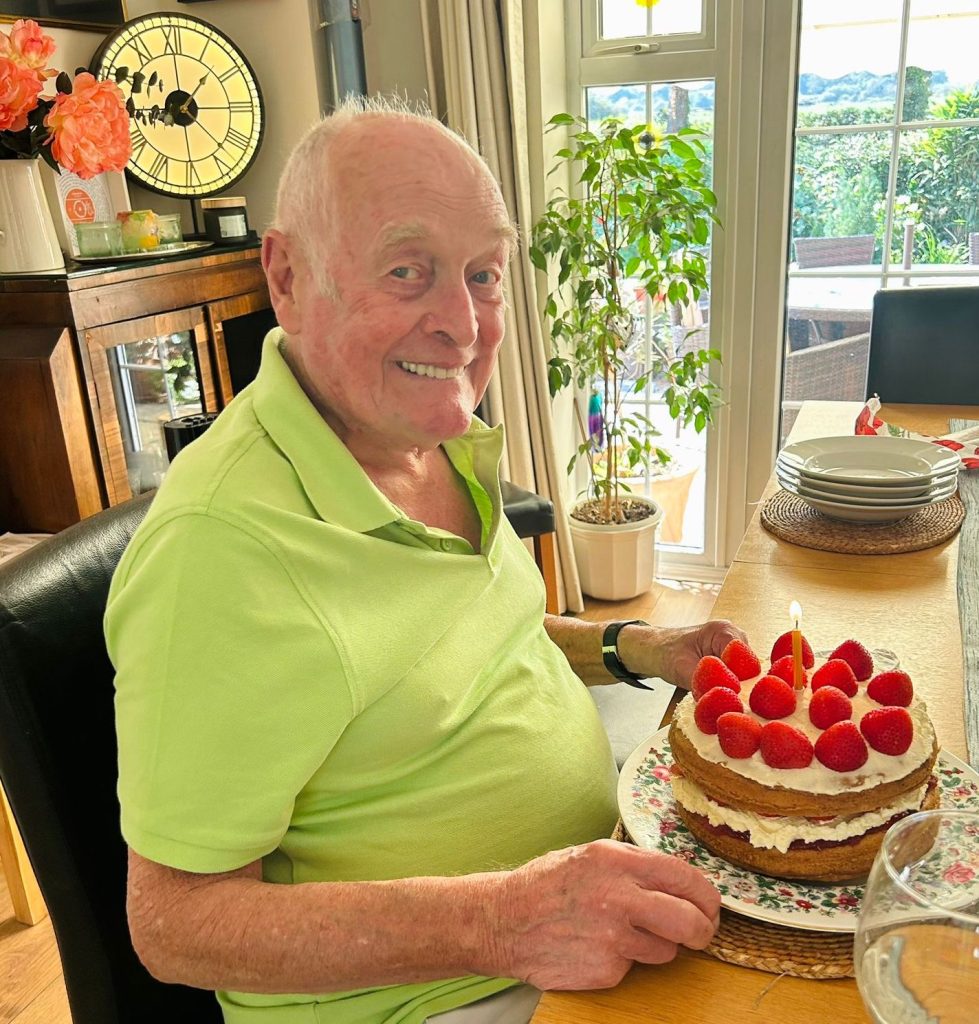
It’s our second birthday celebration in just one week. Our lovely guest Peter, who recently turned 88, also has a fascinating background.
He started out as a telephone engineer, but was always a keen sportsman. He changed career by joining the Beds School of Tennis, receiving his professional coaching registration in his twenties. He set up Tennis Coaching International and travelled extensively. One of the highlights of his career was playing at Wimbledon in the final of the 2010 under-75 veterans, where he lost to the no 2 seed.
Peter lives with his wife Pam, whom he met in 1960, and they’ve been married for nearly 60 years. They have raised three children and have six grandchildren. Both daughters live overseas – Suzanne in Spain and Louise in the US – while Christopher lives nearby.
The good old days
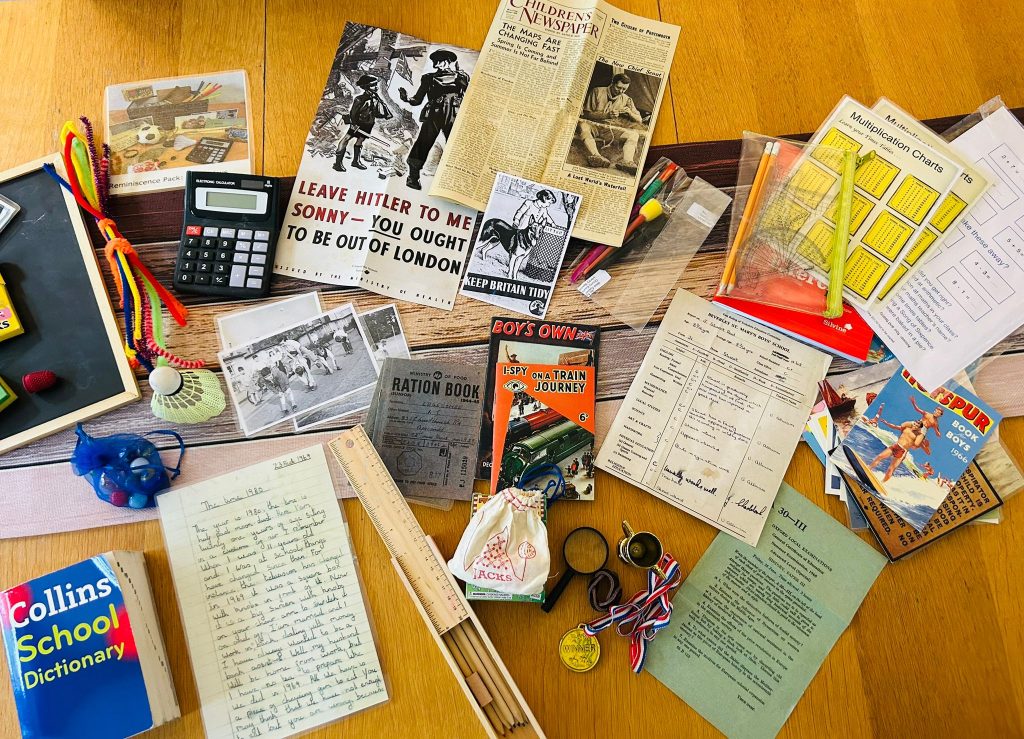
That reminiscing can help reawaken the memory of someone with early-stage dementia? And did you know that your local library gives you access to more than 200 reminiscence packs, with subjects ranging from 1940s to schooldays and washdays?
Many older people find reminiscing enjoyable as it allows them to look back on their lives and rediscover past experiences. It can help maintain self-esteem, confidence and a sense of self.
Our hosts often use these collections as a springboard to prompt guests’ memories and discussions during club days.
Here’s a link to West Sussex Libraries reminiscence collection page if you would like to borrow one for a family member: https://arena.westsussex.gov.uk/-/reminiscence-collecti-1
And here’s the link to the Surrey County Council version:
A man who has helped engineer our future…

Whatever your age, birthdays are the perfect opportunity to take a moment to reflect on your life.
One of our guests, Peter, who recently turned 77, has contributed to all our lives more than most. During his 40-year career as a chartered civil engineer, he not only oversaw the building of numerous harbours, roads and bridges, but also the Channel Tunnel and Thames Barrier.
He was born in Croydon and grew up in Leatherhead with his brother and sister. He studied at the University of Birmingham. Peter’s work took him and his family to Oman for eight years in the 1970s as well as Dubai for another eight years. Peter was in Hong Kong for the turnover to the Chinese. He returned to the UK in the late-1990s and related his overseas engineering experiences as a trainer to young engineers.
Peter has three children and eight grandchildren. His elder son lives in France, his daughter in Florida. He lives with his wife of 51 years and dog Suki, and has enjoyed weekly visits to our host in Beare Green for more than a year now.
Apart from reflecting, our host in Beare Green, Kerrie, baked him a chocolate cake to mark the occasion, which was much enjoyed by all the day’s guests.
How can you engage someone with memory loss?

If you are living with dementia or have a family member who is, it is all too easy to run out of things to say and do, but there’s no need to struggle.
There are so many activities that span huge age ranges and provide entertainment all round. Just because you have memory loss doesn’t mean you can’t play cards, for example. You may not be able to play bridge any more, but mental arithmetic is not usually affected.
Our inventive hosts report on the optional activities they offer for each club day they run. So, we decided to list all of them. And it totted up to an incredible 140! From bingo and dominoes to armchair exercises, tabletop curling, gardening, Jenga, music quizzes, odd-one-out card games to pasta making, gardening, riddles, scrabble and reading funny poems.
Here is a little video of our host in Ditchling, Liz, making pasta with one of her guests.
How you can help yourself
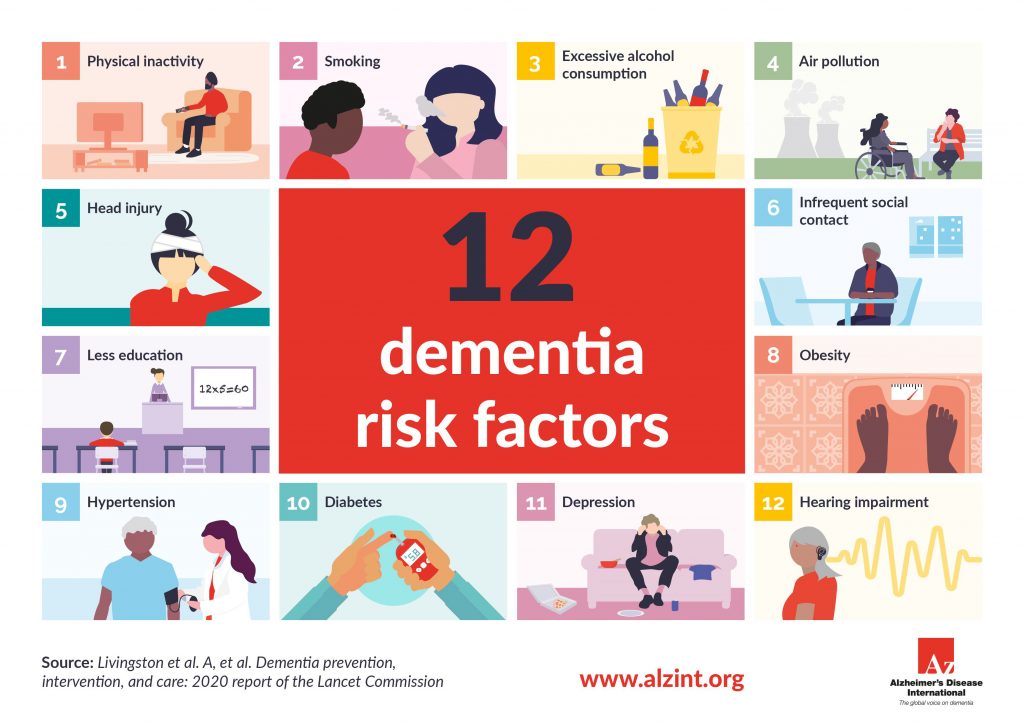
Many people still believe – wrongly – that dementia is a normal part of ageing. That’s why the theme for this September’s World Alzheimer’s Month is “Never too early, never too late”.
Although you are more at risk of developing Alzheimer’s disease and other types of dementia the older you become, dementia is not a normal part of ageing.
Apparently, current thinking is that there are more than 20 genes which affect your risk of developing Alzheimer’s, but they are estimated to account for less than 1% of dementia cases. So that’s great news.
The other great news is that although we can’t change our genes or stop ageing, there are changes that we can make to reduce our risk of dementia. And these changes may prevent or delay up to 40% of cases.
The 12 dementia risk factors are:
- Physical inactivity
- Smoking
- Excessive alcohol consumption
- Air pollution
- Head injury
- Infrequent social contact
- Less education
- Obesity
- High blood pressure
- Diabetes
- Depression
- Hearing impairment
There is lots more helpful information on the subject at alzint.org/get-involved/world-alzheimers-month/
August 2023
Brenda’s birthday treat
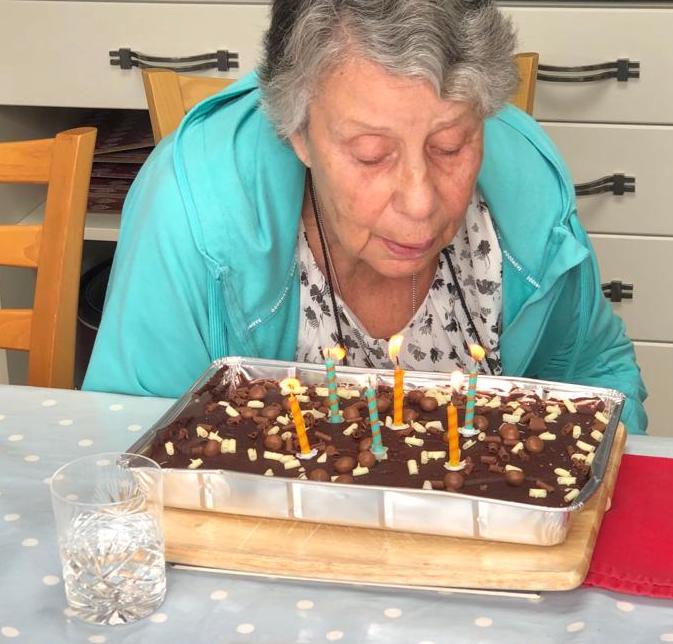
Our guest Brenda celebrated her 79th birthday recently with our Horsham host Kate. It’s always fascinating to learn about the lives of guests and Brenda is no different.
She retired only three years ago, and spent 33 years working nights at the Tesco bakery in Broadbridge Heath. At one point she also worked in the theatre at Christ’s Hospital.
She lives with her husband and raised three children. She now has eight grandchildren and five great-grandchildren.
Tried-and-tested pudding

Our wonderful hosts – who provide a home-cooked, two-course meal for their dementia guests up to three times a week – know a thing or two about entertaining. So we asked them for some of their guests’ favourite dishes.
Of course, puddings are always rather popular. It turns out that the Waitrose recipe for lemony almond and apricot cake is a bit of a hit.
Those guests that have memory challenges may not remember what they’ve eaten, but they do know whether it was tasty or not.
In case you’d like to try it, here is the recipe: https://www.waitrose.com/home/recipes/recipe_directory/l/lemony-almond-apricotcake.html
It’s National Dog Day on Saturday 26 August!
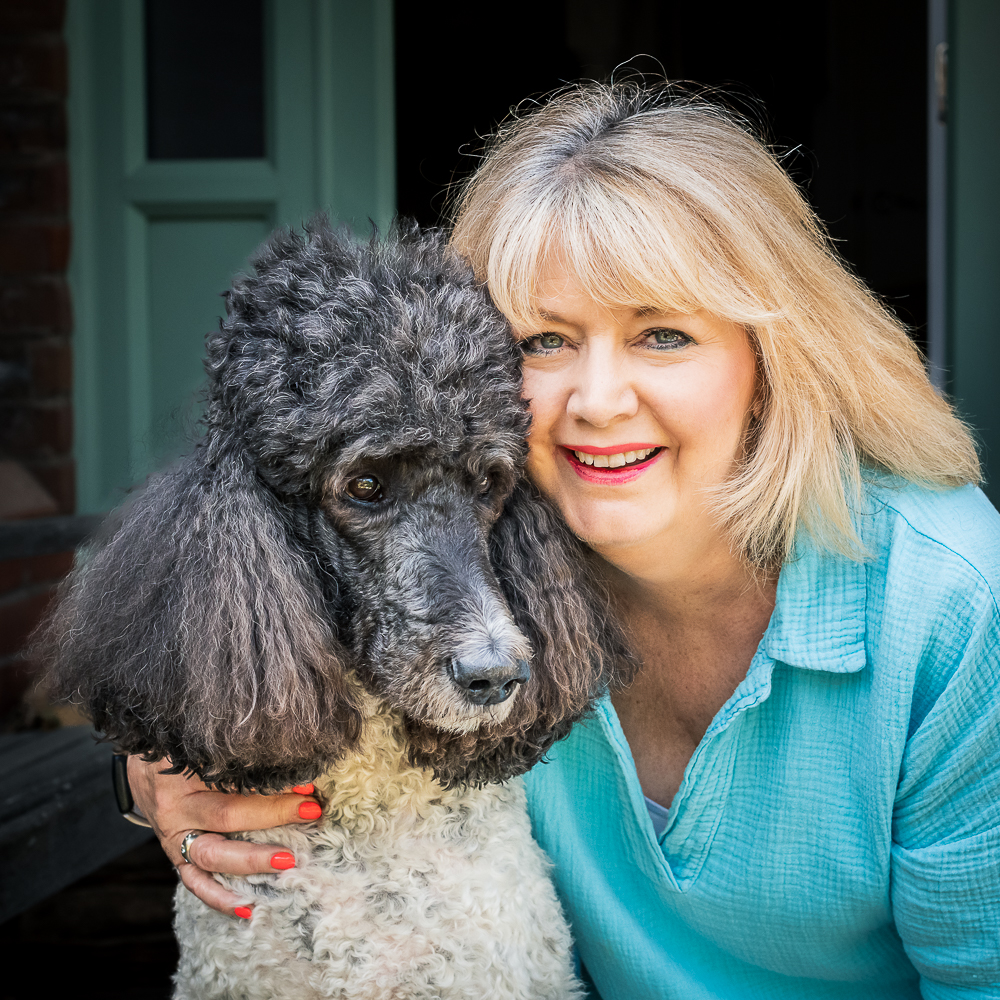
If you own a dog, you know exactly how much joy they bring to your life. Our four-legged friends also make a huge difference to the lives of those living with dementia. They improve self-esteem and confidence, and help older people be more interactive.
At Tapestry Day Club headquarters, we are all dog lovers and want to join in honouring our amazing companions. Several of our hosts have dogs, one of which is a therapy dog (he’s the dog pictured with his Mum Katie – a standard poodle called Enzo). Dogs reduce anxiety and improve mood as well as communication. They are also frequently a source of entertainment.
Of course, National Dog Day honours all dogs, ones that save lives, keep us safe and bring comfort. Dogs put their lives on the line for us every day. They protect families and homes, work as law enforcement partners detecting bombs and drugs, as assistants for people with health conditions and impairments as well as locating and rescuing victims of accidents and tragedy.
Visit nationaldogday.com, for more info.
Celebrating our hosts
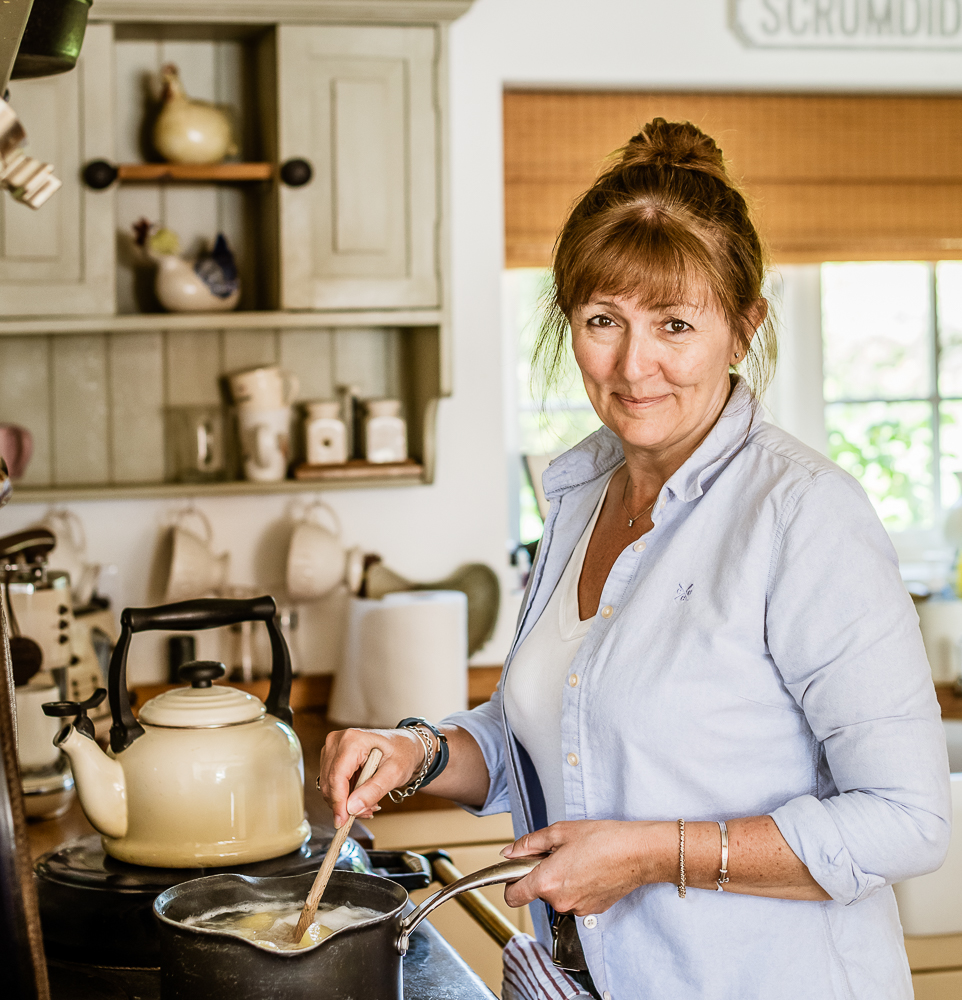
It takes a special sort of person to invite a group of up to six complete strangers, older people, often with dementia, into your private family home for the day; to cook them a delicious two-course lunch as well as provide other refreshments, entertainment and transport.
But that is exactly what our totally incredible team of hosts do. Yes, they are well-paid, trained and supported. Even so, it takes someone with empathy, energy, sensitivity, compassion and can-do attitude.
Facilitating stimulating, small-group day care in such a comforting environment allows lasting friendships to form, it gives guests structure to the week and confidence, in addition to often much-needed “me-time” for carers. It means guests are able to remain living independently for as long as possible.
Storrington-based host Katie Bridge explains why she enjoys her job so much: “What I love most is that it’s both fulfilling and fun. Knowing you’re making a positive difference to the lives of your guests and their carers is so humbling and uplifting.”
Another host, Sara Short (pictured), from Tisman’s Common, adds: “When I tell people what I do, the most common response is ‘oh, how lovely’ and that’s exactly what it is. It’s more than a job. It’s about giving back to a community of people who deserve to get out and have a lovely day. I have the pleasure of being able to provide that. Their smiles at the end of the day are my biggest reward.”
And that says it all really.
There is information about each of our lovely hosts on the Our team page and a little video clip to view here.
Build a better life

It is well known that suitable activities and games can help a person with dementia to achieve purpose and enjoyment. They also encourage socialisation. If people don’t have the opportunity to interact socially with each other, particularly those living with dementia, they can feel lonely, isolated or depressed.
This is why our hosts offer a wide variety of games during Tapestry Day Club days. The best thing is that these can be enjoyed with family members and carers of pretty much any age.
Jenga is a particular favourite. It sounds easy but requires physical and mental skill. Players take turns removing one block at a time from a tower constructed of 54 blocks. Each block removed is then placed on top of the tower, creating a progressively more unstable structure. The concentration is palpable.
Can you smell the roses?

Dementia has been in the news once again. There is more research indicating that losing your sense of smell is a sign that you are at an increased risk of developing Alzheimer’s.
I can’t remember ever having a good sense of smell, particularly since having Covid back in 2020. As my nan had Alzheimer’s and my dad was diagnosed a few years ago with early-onset, I do fear I am at high risk.
But how worried should you be and what can you do about it? It’s brilliant that all this research is being done, but having established that you are at increased risk of developing this devastating disease, what can you do? Apart from a healthy diet, keeping active and socialising, it appears to be in the lap of the Gods. I for one am keeping fingers crossed someone clever somewhere in the world can find a way of staving off dementia successfully.
The latest study is published on neurology.org if you are minded to learn more.
As if you need an excuse…

This year’s Afternoon Tea Week, which celebrates the great British tradition of afternoon tea, takes place from 7-13 August. Venues across the UK will run a selection of exclusive discounts of up to 30% off afternoon tea. It’s the perfect excuse to catch up with loves ones over a cup of tea and some delicacies.
Of course, if you’re a guest of Tapestry Day Club, you enjoy afternoon tea each and every day you visit one of our clubs. Our hosts pride themselves on presentation, too.
If you would like to take advantage of Afternoon Tea Week offers and discounts as well as take part in the biggest ever survey to settle the “jam versus cream first” debate and be in with a chance of winning one of five afternoon tea for two vouchers, visit afternoontea.co.uk for more info.
How do you measure success?
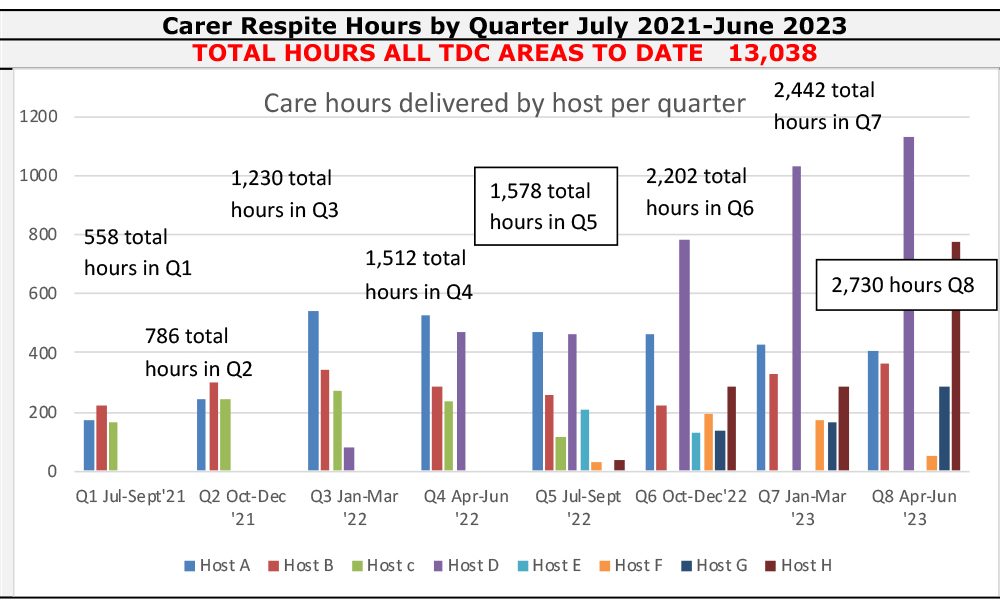
Well, we’re celebrating! Because we have smashed our target of providing 10,000 hours of respite care in the past two years – by more than 3,000 hours! – and we have supported more than 100 families since launching in 2019.
As a not-for-profit Community Interest Company, we pride ourselves on helping people living with dementia and loneliness, but equally, possibly more important is the hours of “me time” we provide through our club to the carers of our guests. That’s why we started tracking just how many hours of respite care our amazing hosts facilitate.
When Tapestry Day Club relaunched after the Covid lockdowns, we provided 558 hours of respite care in the three-month period from July to September 2021. The data shows a steady, positive trajectory every quarter since then. However, in our most recent quarter, we surpassed ourselves – providing a staggering 2,730 hours!
Each time a guest attends a Tapestry Day Club, a carer will have a break of up to six hours. Looking after someone with dementia can be exhausting mentally and physically. It’s the repeated questions, finding something to talk about or do that won’t cause anxiety yet is engaging and stimulating. If you have ever looked after someone with dementia, you will understand how frustrating it can be and why this is how we measure our success.
What the carers say
“Tapestry has been a godsend for us. Mum loves it and can’t wait to go off with her host. Thank you for all the care and joy you are giving mum. She comes home so happy, and anything that has been bothering her seems to disappear.
Louise, daughter of a Tapestry Day Club guest
“Thank you for being the most wonderful lifeline for us. You are all the best thing that could have happened to Mum. She was so concerned at having to miss Tapestry. Isn’t that lovely, you have become Mum’s second family.”
Brenda, daughter of a Tapestry Day Club guest
July 2023
Spread the word
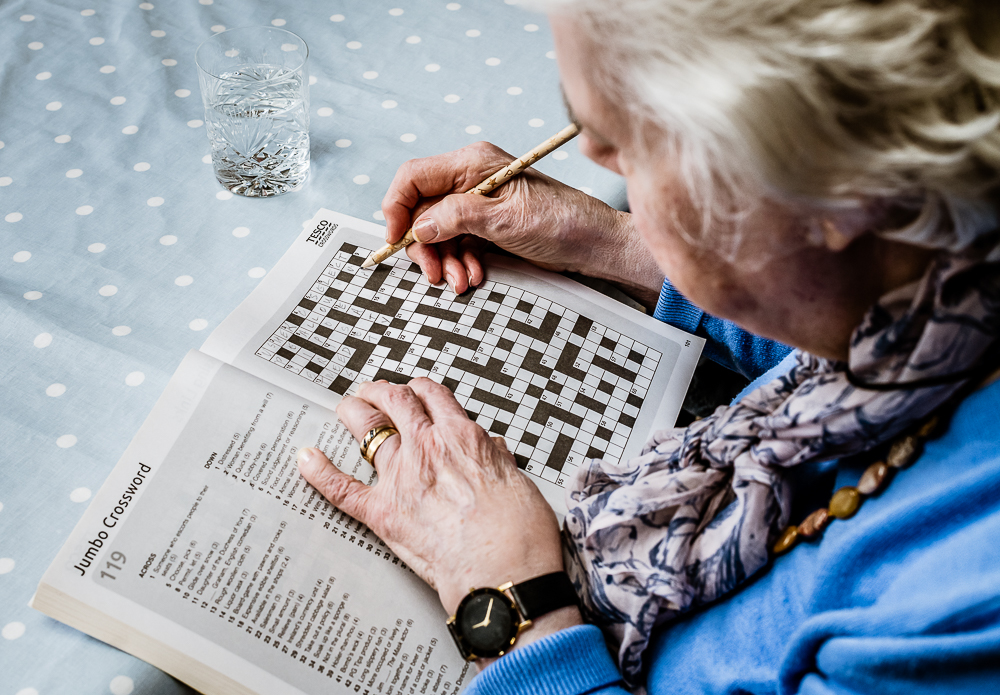
Suitable activities and board games can help a person with dementia to achieve purpose and enjoyment. They also encourage socialisation. If people don’t have the opportunity to interact socially with each other particularly those living with dementia, they can feel lonely, isolated or depressed.
Over the next few weeks we will be looking at different activities offered by our hosts. All of which can be enjoyed with their families and carers.
Many of our hosts start their day with a group crossword, they are a fun and engaging way to keep the mind active and stimulated. Crosswords can help improve memory, concentration, and cognitive function.
Would you live in a care home?
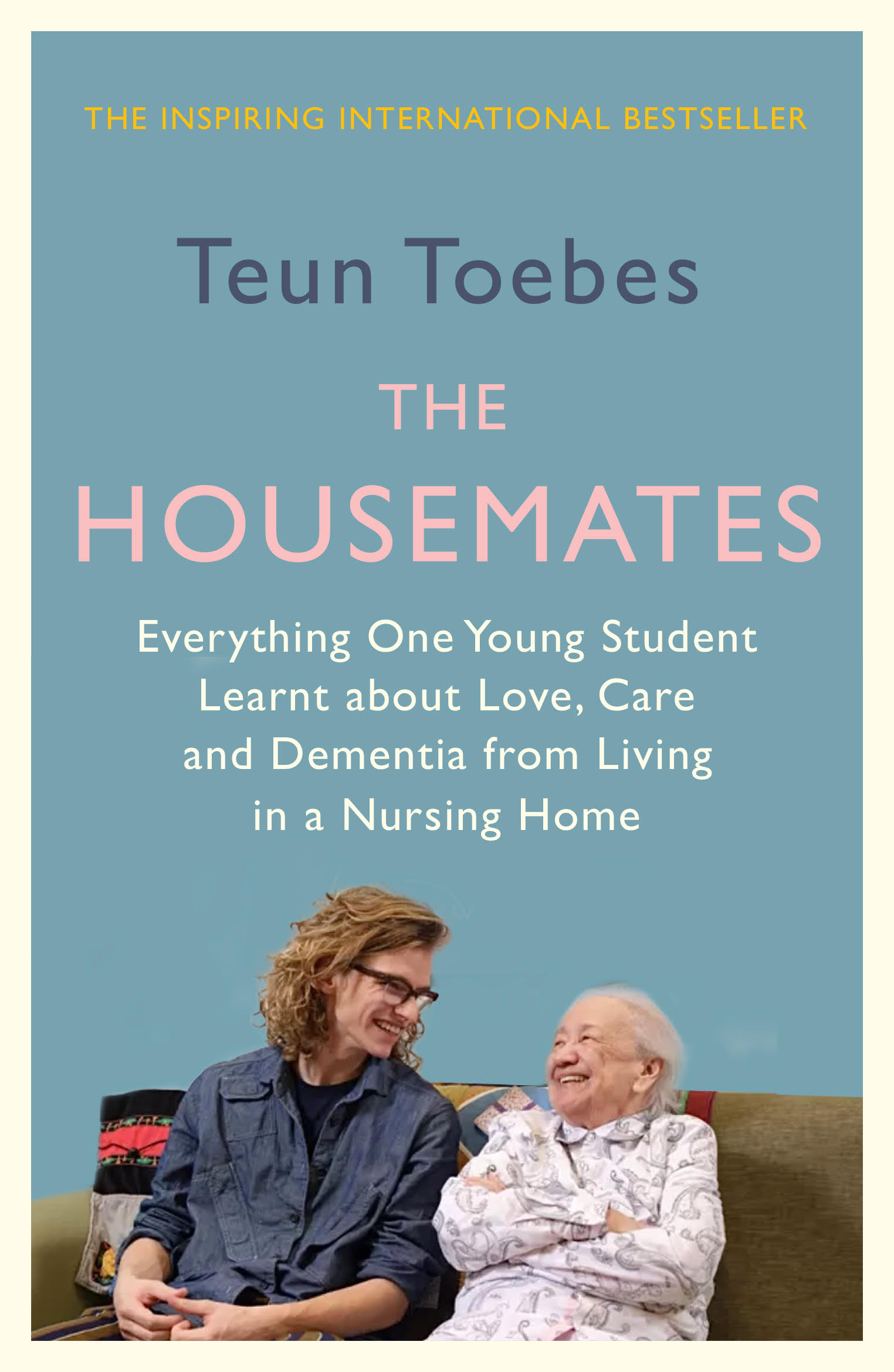
And not just in a care home, but on a dementia ward? Well, that’s exactly what a 21-year-old Dutch nursing student did a few years ago. Tuen Toebes decided he wanted to experience the daily life of residents not as a nurse or carer, but as a housemate.
Three years on, his book The Housemates, is a number one bestseller in the Netherlands. His story is a heartfelt cry for change in how we care for older people.
He initiated Friday drinks, trips out and camping evenings. Then he reintroduced the small things in life which give us so much pleasure: a laugh, dance, cup of good coffee, a chance to sit in the sun. Tuen became aware of how society and the care system diminishes older people and particularly people living with dementia.
This is exactly why Tapestry Day Club was launched, to allow older people living with dementia to stay as long as possible in their own homes and continue to be a valued member of society.
Whatever your age, there’s nothing as precious as sharing a home-cooked meal, having a natter over a cuppa, listening to music and playing optional memory-boosting games in the company of friends. All this can be arranged for you in a private family-home environment and transport can usually also be laid on if needed.
I for one can’t wait to read The Housemates, which is on sale from 3 August at £12.99: https://septemberpublishing.org/product/the-housemates-pb/
Making birthdays special
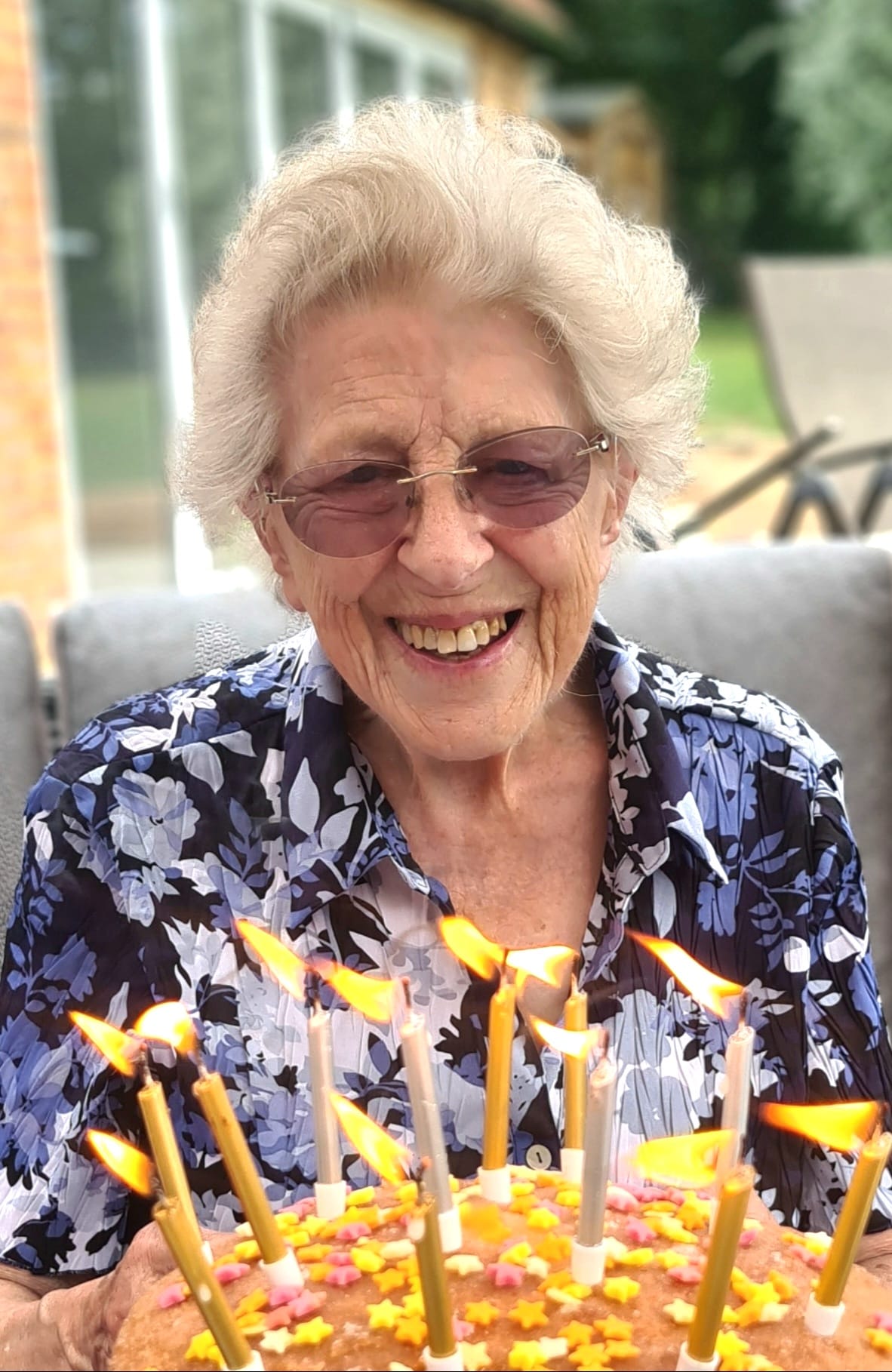
Many happy returns from all of us at Tapestry Day Club to Bobby, who is celebrating her 97th birthday with her favourite cake, lemon drizzle, baked by our wonderful host Sara in Tisman’s Common.
Bobby has been a member of Tapestry Day Club for more than two years now and attends twice a week. She is a former nurse who served in the Queen Alexandra Nursing Corp and has raised four children.
Amazingly, she still lives independently in the same house she has lived in since 1959 – that’s an incredible 64 years! And our aim is to help her to stay living there for as long as possible.

Why you should have your hearing checked from the age of 60
Wearing a hearing aid can slash cognitive decline by half in people who are at risk, according to the latest and largest clinical trial, published in The Lancet. Not only that, but the Aging and Cognitive Health Evaluation in Elders (ACHIEVE) study shows that hearing loss is present in 65% of adults over the age of 60.
I have seen the difference a hearing aid has made to my dad, who has early-onset Alzheimer’s, but I had no idea that loss of hearing impacts dementia to this extent.
“Hearing loss is very treatable in later life, which makes it an important public health target to reduce risk of cognitive decline and dementia, along with other dementia risk factors such as less education in early life, high blood pressure, social isolation and physical inactivity,” said Frank Lin of Johns Hopkins University School of Medicine and Bloomberg School of Public Health, and co-primary investigator of the ACHIEVE study at the recent Alzheimer’s Association International Conference in Amsterdam.
Have you heard about the latest Alzheimer’s drug?

Following last week’s devastating news that journalist and broadcaster Fiona Phillips has been diagnosed with Alzheimer’s at the age of 62, it is so heartening to read that trials of the new drug, Eli Lilly’s donanemab, confirm it slows cognitive decline.
Several of Tapestry Day Club’s guests developed early-onset Alzheimer’s in their sixties, so any progress as regards research, treatment and awareness of this debilitating disease fills us with hope and excitement.
Do read BBC’s in-depth article about this trailblazing treatment and the effect it is having on one of the few patients in this country who is taking part in this global trial: https://www.bbc.co.uk/news/health-66221116.
If you know an older person who would benefit from socially stimulating, small-group day support in a family home or if you need a break from looking after a person with early-stage dementia, please contact us on support@tapestrydayclub.co.uk.
Tapestry Day Club provides day care with a difference across Surrey and West Sussex.
June 2023
The magic of music
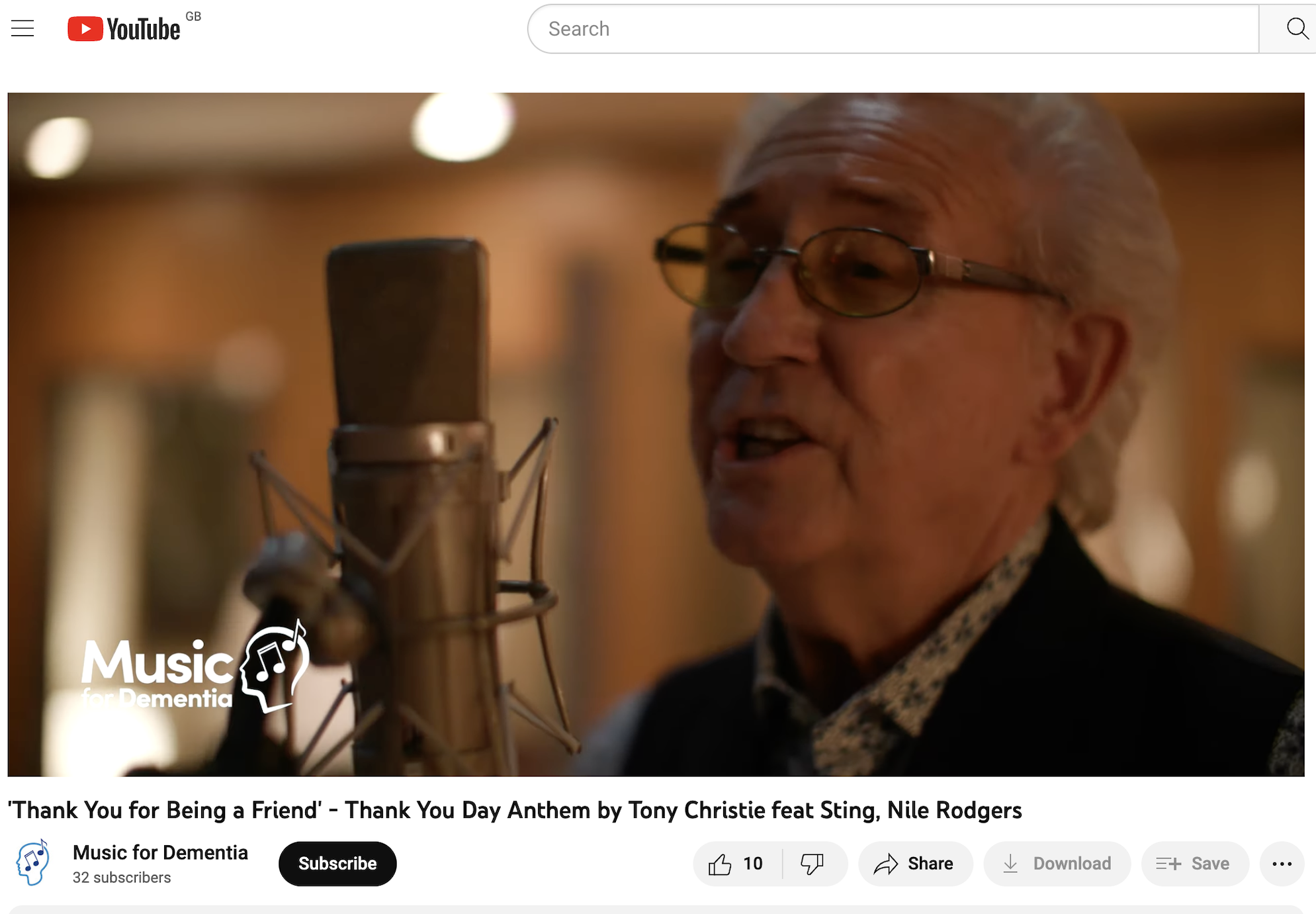
Wow, Tony Christie – of Is This The Way To Amarillo-fame – has teamed up with Music For Dementia to rerecord Thank You For Being A Friend – featuring Sting and Nile Rodgers among other stars – to raise awareness of dementia and thank carers for their support. Tony, who turns 80 this month, revealed he is living with dementia earlier this year.
It means so much to have famous people involved in raising awareness of this cruel disease. Our hosts know exactly how powerful music can be and use it to help guests relax and engage during their Tapestry Day Club days.
Visit https://youtu.be/1tQrDI_neG0 to listen to the song.
Welcoming our new team member
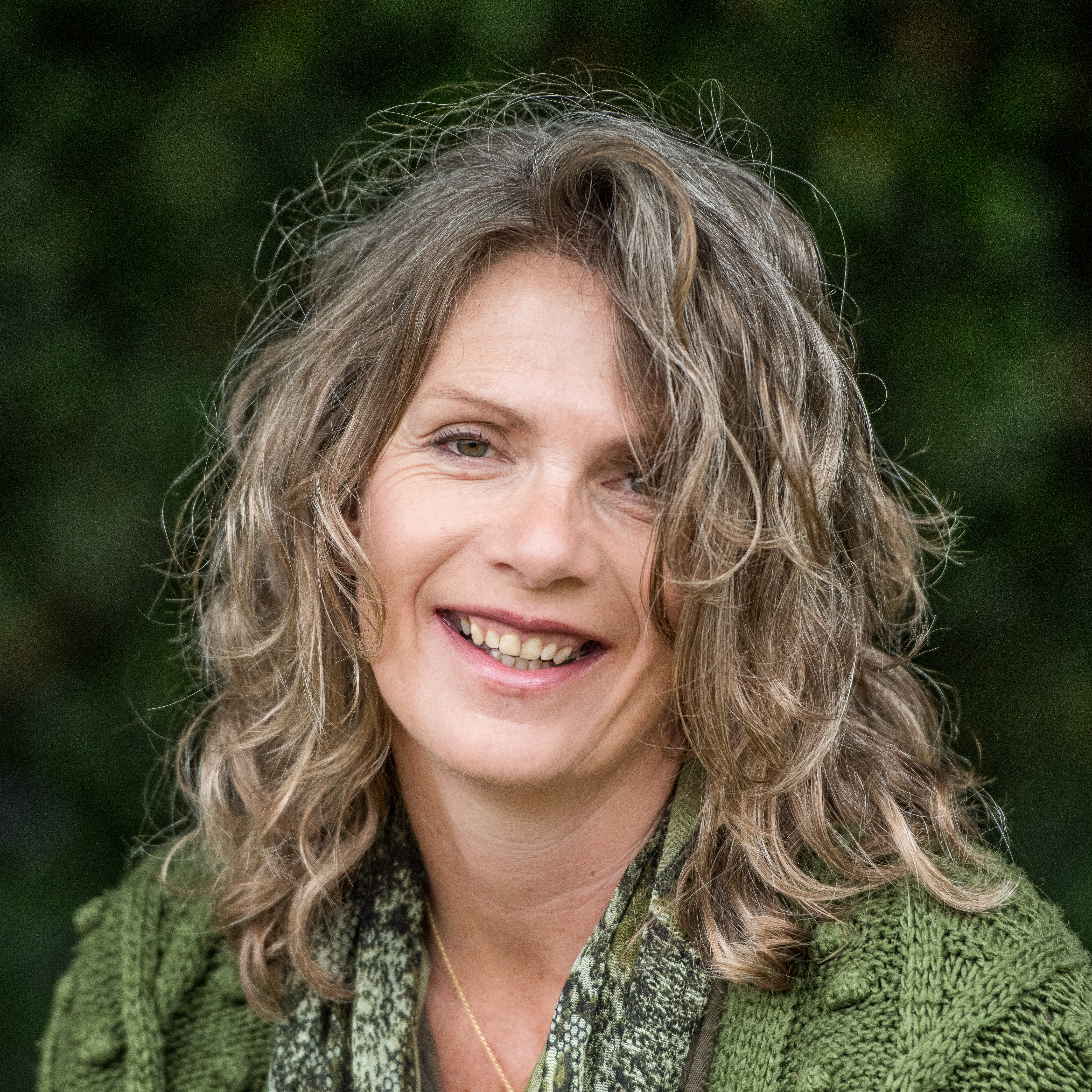
We are very pleased to welcome to our team, Leslie Bliss, who will be helping us keep the wheels running smoothly at Tapestry Day Club. She has deep personal experience of supporting people living with dementia with an understanding of the challenges facing families. She is also an amazingly accomplished photographer so we are looking forward to sharing her photos of our guests and their hosts.
May 2023
Inspiring Chelsea Flower Show garden
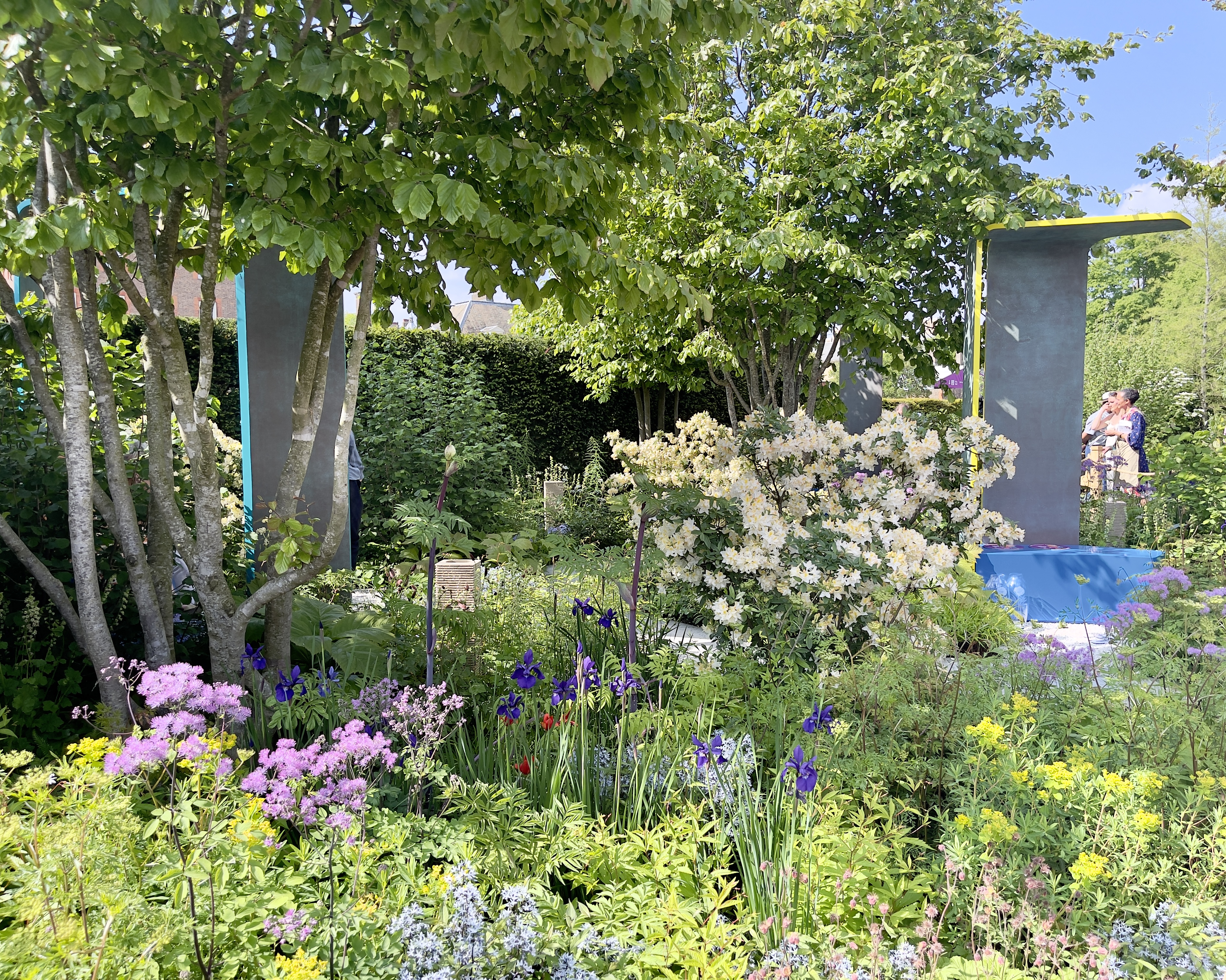
Out and about for Dementia Action Week
It’s Alzheimer’s Society’s Dementia Action Week, so we’re out and about with our stand to help raise awareness. Do come and say hello if you’re near Godalming library between 2-4pm on Wednesday 17 May.
Then we will be in Horsham’s Swan Walk shopping centre 10.30am-4pm on Friday 19 May.
If you know anyone with early-stage dementia who might benefit from a social day out in a small group, please get in touch. Our hosts provide transport and welcome guests into their home for a two-course, home-cooked lunch.
We’re also looking to recruit more hosts in the Horsham area. If you would like a rewarding, well-remunerated part-time job, please get in touch.
March 2023
We are very appreciative to SMART Cranleigh working with John, one of Memory Lane’s guest. John was diagnosed with Dementia in 2016 and he was keen to share his experiences of living with Dementia and the challenges he has to face day to day. All of us at TDC are humbled by his honesty and eloquence. He has helped us to have a far greater understanding as to how we may be better at supporting our guests and their carers and families.
Please do take a few moments to watch the video – Interview with John
December 2022
Thank you Crawley Borough Council for funding our guests’ Christmas lunch during the week 19 – 23 December 2022. The funds will help towards an extra festive meal with all the trimmings plus crackers and party hats.
November 2022
Thank you to the Co-Op for supporting Tapestry Day Club with a grant from their Co–op Local Community Fund. These funds will be used to support the community of Cranleigh.
May 2022
We are delighted to be receiving funds from the Waverley Thriving Communities Commissioning Fund for the next 3 years. This has allowed us to increase our support in Waverley and we look forward to welcoming our guests from across Waverley Borough Council.
July 2021
We are thrilled to be working in partnership with Age UK West Sussex Brighton and Hove and funded by West Sussex County Council in the deliver their Short Care Breaks to provide the opportunity for carers of people living with dementia and carers of frail older people to take some time for themselves, knowing the people they care for are in a safe, stimulating environment.
June 2021
We have once again opened our doors which is very exciting and welcomed back a number of our guests. Equally we are getting lots of enquires to join our day clubs. At the same time, we have welcomed 4 hosts from all over Sussex and Surrey. Take a look at Our Team page.
November 2020 – April 2021
We have kept very busy over the last six months, supporting online and are coming to the end of our online tea parties which have been resoundingly successful, supporting over 30 people on either their own digital tablets or tablets loaned by us using National Lottery Funding. We have been delivering boxes of tea to door steps with a check in and chat from our baking hosts. Followed by a Zoom themed get together every week. Many of our guests struggle with memory issues associated with dementia, and the feedback from family and friends has been incredibly positive.
Even though our National Lottery Funding has come to an end, we will continue to offer online digital support to both carers and their loved ones going forward. We are now focussing on opening up our lunch clubs again and bringing people together face to face. Our small, intimate lunch groups have always been the core of our support for the socially isolated, those experiencing early stages of dementia and providing necessary respite care to the carers.
19 October 2020
We are thrilled to announce that we have received some very generous funding from The National Lottery Coronavirus Community Support Fund. This incredible grant will enable us to offer an introductory day rate of £50.00 which is a 30% reduction on our regular day rate. This offer is for limited period only and still includes transportation, refreshments, home cooked lunch and optional activities.
28 July 2020
We are delighted to be working closely with Horsham District Council and Waverley Borough Council in our mission to support the socially isolated, vulnerable elderly and those living with early stage Dementia. Their support has come in the form of both critical funding and guidance on how to connect with other support groups, voluntary action groups and Council teams to help expand the knowledge of our service offering across the West Sussex and Surrey areas.
14 July 2020
As soon as the Government guidelines allow for more than two households to meet indoors, we will be ready and excited to be reopening our lunch clubs and to welcome back our loyal guests and welcome new guests to our family. Our number one commitment remains the welfare of our community and our team as we take these first steps together.
After close and careful consultation, we’ve put in place measures designed to ensure the safety of our employees and our guests alike. This is our new “business as usual”, and we have carried out a full risk assessment for both our hosts’ and guests’ safety and well-being.
Please contact us if you would like to see our Risk Assessment : support@tapestrylunchclub.co.uk
Thank you for your support and commitment to working together to reduce the spread of COVID-19. Please remember your health and safety is absolutely paramount to us.
23 March 2020
Following the Government’s announcement on 23 March, Tapestry Lunch Club has had to suspend all its services with immediate effect. We are very sad that we are unable to continue in the current climate and we’d like to thank all those who have supported us. Please stay safe and follow all government guidelines.
12 March 2020
Tapestry Lunch Club takes the health and welfare of our guests extremely seriously. Following the Coronavirus outbreak, hygiene remains our priority. All ours hosts are qualified up to Food & Hygiene Level 2 and we have introduced a range of measures to protect our guests and hosts whilst minimising disruption and maintaining our high standard of service. We would like to reiterate that there are no known confirmed cases of Coronavirus within our hosts or guests.
We ask that, if you are showing any flu-like symptoms and have a lunch booked with us that you please inform Tapestry Lunch Club in advance who will look to reschedule your booking once your symptoms have passed. Please email support@tapestrylunchclub.co.uk or by phone 01403 791020.
Please rest assured we are doing all we can at this stage to combat the threat of Coronavirus and will continue to monitor the situation and update you should our previous advice change significantly.
1 February 2020
Tapestry Lunch Club is now up and running and we have launched our day care service which includes a wonderful home cooked lunch and all transport. We have fully trained hosts in Billingshurst, Kingsfold, Cranleigh and Hove.
We are always looking to hire more hosts for this pilot phase, with the view to offering permanent employment on the back of it’s success. We are also looking for guests across West Sussex and Surrey areas.
Please get in touch through our contacts page if you are interested in hosting or know of anyone who would benefit from our Lunch Club offering


